Roberto Di Pietra, Rector, University of Siena
From 10 to 13 June, 2025, the celebratory conference marking the 40th anniversary of the Coimbra Group was held at the Alma Mater Studiorum – University of Bologna. In the precious and erudite city of Bologna (Bologna la Dotta), we discussed important topics concerning the life and future of universities. During the Closed Rectors’ Meeting, we had the opportunity to exchange views on key issues concerning the development prospects of the universities belonging to the Coimbra Group.
We notably focused on the implementation of the EU’s “Union of Skills”, which we should leverage to best fulfill our missions and address the needs of the world around us. In this regard, key themes emerged, such as inclusion, the use of new digital technologies (e.g., artificial intelligence), autonomy, and others. Defining the areas of development for the university of the future—understanding which features we must embrace to respond effectively to society and educate the citizens of tomorrow—is certainly both important and necessary.
However, I believe that in this historical phase, certain requirements must be clearly identified and reaffirmed. Universities (both the oldest and the most recent) face a pivotal moment in which the fundamental elements that define what a university is are not always evident to all.
There are boundaries that are dangerously fading and becoming blurred.
There are actors who, without possessing the requisite characteristics, seek to assume the roles that universities have fulfilled for centuries.
There are approaches to teaching and research activities that challenge the very meaning of the existence of universities.
All of this deserves careful reflection and calls for a clear statement from universities—perhaps even before identifying the new skills needed for the future.
We must reaffirm, repeat, and confirm the elements that define the identity- of a university. These are the essential requirements that any institution must possess in order to be called (and to truly be) a university. They are characteristics and activities without which we are not dealing with a genuine university. These foundational elements constitute the prerequisites upon which we can build the university of the future (but they must preexist).
We need to clearly address two fundamental questions:
– What makes a university a university?
– Despite the differences among universities, what is the minimum common denominator they are supposed to have in common?
These foundational elements define the identity of universities. Upon this identity, we can build the skills needed for the future, but without it, we risk seriously endangering our future.
Universities are defined by the implementation of learning processes (and thus teaching) that are grounded in the socialization of individuals within educational paths, on the experiential dimension of learning, and on the creation of a university community within specific locations (cities) where these paths take place, are organized, and are localized.
University education cannot disregard the human exchange intrinsic to teaching activities. This is part of human nature.
Certainly, technology provides tools that enable activities to be conducted remotely, both synchronously and asynchronously. Certainly, digital tools allow forms of interaction that were unimaginable in the past. Certainly, the potential offered by artificial intelligence is still not fully understood.
In human learning processes, these technologies can play a “supportive” role, but not a “substitutive” one. They can enhance socialization—but they cannot and must not replace it. Similar reflections apply to the conduct of research activities, which increasingly require collaborative forms and the construction of internationally extended networks. Research is increasingly less and less an individual endeavour and more a shared effort among groups of people, often spanning different scientific disciplines.
Technology contributes to these interactions, but it certainly cannot and must not replace the process of socialization of ideas, insights, and creations. The teaching and research carried out at universities are the driving force behind their social impact, in terms of innovation, technology transfer, and public engagement. Even here, we must reaffirm the role of universities in their countries, regions, and cities. Technologies can facilitate universities’ connection with society can, but they cannot replace the human bonds and relationships that underlie that connection.
Institutions that do not carry out all these activities, or do not enliven them through human relationships, lack the essential requirements that form the identity of a university. We need to find the time and means to reaffirm, clearly identify and clearly communicate these foundational elements—first and foremost to ourselves, and then externally. It is essential for institutions responsible for higher education, at both national and European (Union) levels, to clarify what a university is and must be. This affirmation may seem obvious, given that universities have existed for hundreds of years—yet today, more than ever, a clear statement on this topic is needed.
I hope that the Coimbra Group itself will reflect on these essential requirements, perhaps by drafting a position paper, or even issuing a formal declaration, possibly during one of its upcoming Annual Conferences.
In a Europe that upholds science and research as core values, designating 13 May as European Doctoral Day would affirm the importance of doctoral education, candidates, and PhD holders. At the Coimbra Group, we see them as essential drivers of innovation, crucial for tackling the challenges of a changing world, and key to Europe’s scientific excellence, societal resilience, and global leadership.
A European Doctoral Day would enhance the attractiveness of doctoral education for both European and international students, increase employers’ recognition of doctoral qualifications, and highlight the diverse career paths and societal impact of PhD graduates.
Participating institutions will be invited to organise local events with their socio-economic partners on or around 13 May, starting with the first edition in 2026. A shared communication charter and common platform will ensure visibility across Europe, while existing events can be leveraged to showcase success stories and inspire wider participation.
The Coimbra Group was among the first to support this initiative, launched by the French Ministry of Higher Education and Research. Our Doctoral Studies Working Group, represented by its Chair Adriana Zait (Iași) and Vice-Chair Elise Pinta (Turku), contributes to the European coordination committee.
Already, more than 200 universities and organisations have endorsed the proposal, including several Coimbra Group members. We warmly encourage more universities, companies, and networks to join this initiative. Any interested institution can add their support via this online questionnaire. Together, let’s make 13 May the European Doctoral Day!
The start of this academic year has been marked by profound sadness within the Coimbra Group community as we learned of the passing of two highly valued members of our Working Groups, Professors Marie-Alix Poul-Pearson (Montpellier) and Ferdinando Fava (Padua). Their dedication, expertise and friendship over the years enriched not only the activities of the Coimbra Group, but also the lives of all who had the privilege of collaborating with them. We remember them with gratitude and affection.
Marie-Alix Poul-Pearson
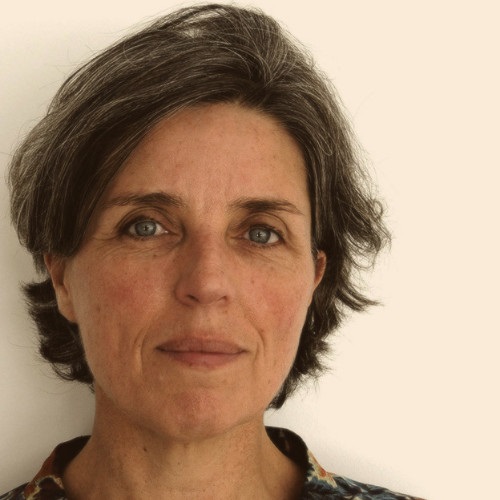
It is with deep sadness that we share the news of the passing of Professor Marie-Alix Poul-Pearson, our dear friend and valued colleague in the Coimbra Group Life Sciences Working Group. Marie-Alix passed away earlier this month, and her loss is felt profoundly across our European community.
Marie-Alix was a dedicated and active contributor to the Coimbra Group’s Cancer Biology Master project, as well as to the Erasmus Mundus Master’s project on Cancer in preparation with the Universities of Pavia and Montreal. At our working group meetings, she consistently brought forward thoughtful proposals and played an important role in shaping the direction of these initiatives. As a Professor of Immunology at the University of Montpellier, Marie-Alix was a respected researcher and a passionate academic leader, notably coordinating the University’s Master’s degree in Cancer Biology. Her professional achievements were matched by her warmth, positivity, and unwavering commitment to advancing research and higher education.
She will be deeply missed within the Life Sciences Working Group and far beyond. On behalf of the Coimbra Group, we extend our heartfelt condolences to her family, friends, colleagues, and students, wishing them strength and comfort in this time of loss.
Ferdinando Fava

It is with deep sorrow that we announce the passing of Professor Ferdinando Fava, our dear friend and esteemed colleague in the Latin America Working Group. As a geologist and anthropologist, and Professor in the Department of Historical, Geographical and Antiquity Sciences at the University of Padua, Ferdinando brought remarkable knowledge and insight to our community.
A passionate scholar, he was deeply committed to the activities of the Latin America Group. His ideas and contributions shaped the way we worked together and inspired many of the projects we developed. His profound knowledge of Latin America -culture, literature, language, and politics- was a source of learning and enrichment for us all. Ferdinando will also be remembered for his gentle character and respectful, thoughtful way of engaging with others. He had a gift for listening, helping us move forward when we were overwhelmed with ideas, and always welcoming with his warm smile and kind presence.
He will be greatly missed, both as a colleague and as a friend. His legacy will remain in the many initiatives he helped shape, and in the inspiration he gave to those who worked alongside him. The Coimbra Group community will carry forward his spirit of curiosity, generosity, and collaboration. On behalf of the Coimbra Group, we extend our heartfelt condolences to his family, friends, colleagues, and students.
We are proud to announce that four Coimbra Group members have been recognized as the new Champions of the European Student Card Initiative (ESCI). Congratulations to our colleagues at the Universities of Barcelona, Galway, Pavia and Tartu! This year, the European Commission received 123 nominations from across Europe. Among the five institutions selected Champions of Excellence, the Universities of Barcelona and Pavia were distinguished for their outstanding implementation of both the European Student Card ESC and the of Erasmus Without Paper (EWP). Meanwhile the Universities of Galway and Tartu were recognised for their exemplary work in advancing the implementation of the EWP.
ESCI Champions are higher education institutions and organisations that have demonstrated significant progress in adopting the various building blocks of the ESCI. Serving for a two-year term (2025–2027), these Champions play a key role in advancing the Initiative. Their responsibilities include supporting the ESCI through active participation in meetings and national events, engaging in outreach by sharing testimonials and best practices with peers, and contributing to the future development of the Initiative. A kick-off meeting of the ESCI champions 2025-2027 will take place in Gothenburg on 9 September 2025 in the lead-up to the EAIE conference .
“The University of Barcelona is proud to be recognised as ESCI Champion of Excellence, a reflection of its long-standing commitment to the Erasmus+ programme. This is a recognition to the huge efforts of different units and services to ensure that students benefit from a seamless, digital, and inclusive mobility experience. We will be more than happy to share our experience and the acquired knowledge with interested universities”, says Raúl Ramos Lobo, Vice-Rector for Internationalisation Policy at the University of Barcelona.
“Being re-selected as an ESCI Champion for the upcoming period is both a great honour and a strong confirmation that the University of Tartu is on the right path in supporting and implementing the digital transformation of Erasmus+ processes. It strengthens our commitment to sustainable, user-friendly solutions and allows us to continue contributing actively – both nationally and across Europe – to a more efficient and transparent mobility framework”, Jaanika Haljasmäe, Erasmus Programme Coordinator, University of Tartu
More information on the ESCI Champions initiative is available on the European Commission’s website.
Piotr Jedynak, Rector, Jagiellonian University in Kraków
Poland’s six-month Presidency of the Council of the European Union concluded a month ago. Expectations, both within Poland and beyond, were high. Accordingly, a summary and preliminary assessment of its outcomes appears not only appropriate but necessary. While the full impact of the presidency will only become apparent over time, it is already worthwhile to reflect on the achievements of the past six months, as well as on the issues that remain unresolved.
Such an assessment seems particularly relevant in the academic context. This is partly because the slogan that has set the tone for the Polish Presidency – “Security, Europe!” – appeared to refer more to the geopolitical situation on the continent than to the current concerns of the academic and scientific communities.
These concerns mainly revolve around the well-being of students and academic staff, who, according to recent studies, are increasingly vulnerable to educational and occupational burnout. Further anxieties pertain to gender and pay equity, and to the continued underrepresentation of women in European research.
Other urgent challenges include promoting STEM disciplines, developing next-generation digital competencies (particularly those related to the ethical and proficient use of AI technologies), and continuing efforts to enhance the quality, effectiveness, and societal value of scientific research. These objectives must be pursued in accordance with the fundamental principles of academic integrity while minimizing negative social and environmental impacts.
Across Europe, strategic emphasis is now being placed on strengthening collaboration among universities, particularly through various forms of academic alliances, and on gradually integrating national science and higher education systems within the broader European framework.
This direction now defines the majority of academic discourse. It is therefore encouraging that the Polish Presidency of the EU Council not only actively engaged with these discussions but also enriched them with new perspectives. A particularly noteworthy milestone was the meeting of the EU Competitiveness Council (COMPET) on 23 May, during which EU ministers of science and research — under the chairmanship of Poland’s Minister of Science and Higher Education, Marcin Kulasek — adopted the European Research Area (ERA) Policy Agenda 2025–2027.
This document may be regarded as a synthesis of several months’ conclusions around three key priority areas. Its implementation could contribute meaningfully to addressing many of the critical challenges currently confronting the European academic and research sectors. It outlines a broad set of actions organized around three principal dimensions of science and higher education:
- The social dimension: including equal access to education and academic careers, the empowerment of women in research, the promotion of inclusive learning environments, and support for individuals facing mental health issues or social marginalization.
- The structural and systemic dimension: such as advancing open science practices, enhancing researcher mobility and shared infrastructure, and deepening institutional cooperation through cross-border academic partnerships.
- The technological and cognitive dimension: encompassing efforts to raise the quality, innovation, and impact of scientific research across the EU; to harness artificial intelligence responsibly and effectively; and to strengthen the role of science in addressing global challenges, stimulating economic growth, and driving technological progress.
Nonetheless, during Poland’s EU Council Presidency, certain challenges within the European science and higher education landscape remain unresolved. One example is the concept of a joint European degree, a long-standing ambition of many universities across Europe, now being pursued primarily through bottom-up initiatives operating at the margins of existing regulatory frameworks. Progress on this front, however, appears stalled at the level of declarations and preliminary planning. This reflects a broader concern: while European legislation has become more agile, it still lags behind the pace of global transformation.
Looking ahead, there is cautious optimism that the initiatives left incomplete during the past six months of Poland’s Presidency will progress in the upcoming months under the leadership of the next countries in the EU Council Presidency Trio: Poland, Denmark, and Cyprus.
With continued commitment and collaboration, what remains unfinished may yet find a path forward.
Coimbra Group’s input to the European Commission’s Call for Evidence for an EU Quality Jobs Roadmap
The Coimbra Group (CG) welcomes the opportunity to contribute to the development of the upcoming EU Quality Jobs Roadmap, for which the European Commission recently published a call for evidence, in order to receive specific proposals on how to foster quality jobs in the EU. As key actors in education and training of the future workforce, universities play a central role in preparing graduates with the skills necessary to enter the job market, as well as with elements to recognise what constitutes a “quality job”.
The voice of universities is essential in ensuring that employment and social policies reflect and at the same time inform academic offerings, and in ensuring that societal needs at large are taken into consideration. For this, open dialogue and continued cooperation between academia and enterprises is fundamental, in order to allow universities to adapt and improve their offer according to market needs, but also for businesses to better understand and appraise the skills that graduates acquired during their studies.
To gather insights and experiences and elaborate our network’s position, the 42 CG universities, all long-established research-intensive leading higher education institutions, located in 22 European countries, were consulted through their representatives in the Employability Working Group.
The paper outlines the critical role of higher education, and particularly the universities’ career services, in preparing both graduates and lifelong learners for a fast-evolving labour market. It highlights key challenges such as mismatch between the qualifications obtained and the actual positions available, limited access to quality internships and employment especially across specific fields or in specific regions, and insufficient financial and staffing support fora growing and diverse student body, including those pursuing lifelong learning.
To tackle these challenges, the recommendations advanced are:
- Promoting EU-level policies that ensure fair pay and robust hosting agreements for all internships, especially those integrated into academic curricula;
- Increase EU funding for lifelong learning, particularly for learners from disadvantaged regions, and promote upskilling and reskilling through targeted subsidies for university-led professional development and training programs;
- Foster stronger university-enterprise collaborations through structures like a European Skills Council, enabling universities to stay aligned with evolving skills needs in business and industry;
- Support by developing and sharing timely, actionable labour market information that universities can use to adapt curricula and career services to meet emerging employment needs.
Overall, the Coimbra Group calls for more focus on and support to university career services, in so far as they are a critical resource for graduate transitions, as well as more resources for upskilling and reskilling initiatives for lifelong learning activities.
Coimbra Group’s Employability Working Group position paper
The Coimbra Group, through its Employability Working Group, has published a new position paper titled “AI and Digital Competence through Higher Education.” This publication comes as the European Union intensifies efforts to address skills shortages and equip its workforce for the digital and green transitions. The paper outlines the key competencies needed in this context and presents actionable recommendations for strengthening digital education in higher education.
The document stresses that generative AI and other digital technologies are reshaping our societies, economies, and labour markets. To respond effectively, digital competence must be seen as a foundational skill, relevant across all academic disciplines. The Employability Working Group highlights the importance of research-based education, AI ethics, critical thinking, and lifelong learning in preparing graduates for a rapidly changing world driven by innovation, automation, and global shifts.
Key recommendations for AI and digital competence:
- Strengthened support from European Funding Sources
- Investing in high quality teaching
- Implementing a real lifelong learning approach
- Recognising the core role of higher education
- Facilitating policy dialogue on trade-offs between benefits and challenges linked to the deployment of AI in education
Coimbra Group’s initial reaction to the proposal for the Multi-Annual Financial Framework 2028-2034
The Coimbra Group (CG) welcomes the European Commission’s proposal for the next Multi-Annual Financial Framework (MFF). The increase in the combined budget share for Erasmus+ and Horizon Europe, from about 9% in the final MFF 2021-2027 to almost 11% in the proposed MFF 2028-2034, is a promising signal for Universities and for Europe’s future in these challenging times.
“We have repeatedly called on the EU institutions to prioritise investment in education, research, and innovation as essential pillars for driving Europe’s societal and economic growth, advancing sustainable development, and safeguarding the well-being of future generations. We have specifically advocated for a standalone framework programme for R&I, that continues to support collaborative research at all SRLs/TRLs, alongside increased funding for the ERC and the MSCA. We appreciate that the European Commission has taken the sector’s message seriously and acted upon it! It is also encouraging to see the European Universities Alliances referenced in the various proposed draft regulations“, say Ludovic Thilly and Beatrix Busse, respectively Chair and Vice-Chair of the Coimbra Group’s Executive Board.
The EU’s renewed commitment to strengthening education, research, and innovation through its flagship programmes, Erasmus+ and Horizon Europe, with their respective budgets increasing, as well as through the new European Competitiveness Fund (ECF), is a positive development – although the precise budgetary breakdown within each programme is yet to be clarified.
CG especially welcomes the confirmation that Horizon Europe will remain a self-standing programme. Such continuity and predictability are essential for the effective conduct of research. We are also pleased to see the Social Sciences and Humanities recognised as integral to Europe’s research landscape, alongside a commitment to simplification for the programme’s beneficiaries. CG supports the emphasis on expanding the European Research Council (ERC) and the European Innovation Council (EIC) and looks forward to a similar commitment for the Maria Skłodowska Curie Actions (MSCA).
Nevertheless, we eagerly await clarity and reassurance on how the governance, structure and objectives of Horizon Europe and the ECF will be defined and articulated, while firmly reiterating our caution against any attempts to operationally integrate the two instruments or to align their strategic directions. The scientific autonomy of EU research must be unequivocally safeguarded.
The announcement to nearly double Horizon Europe’s budget to €175 billion signals a positive outset for the upcoming negotiations, nearly fulfilling the central pledge by our ResearchMatters campaign in collaboration with leading partners.
CG equally welcomes the proposed 50% increase in the Erasmus+ budget. Setting the programme’s overall budget at nearly €41 billion, supplemented by additional resources from Global Europe, seem to mark a positive step forward. Yet, we look forward to seeing the exact breakdown of funding across the various actions. It is crucial that the foundations for the success of Erasmus+, as a flagship education and training programme, is fully safeguarded in the future.
The programme’s simplification resulting from merging actions pursuing similar objectives is promising. CG encourages the Commission and the EU co-legislators to prioritise the interests of beneficiaries (individuals and institutions at all levels) when entering in negotiation. CG takes also positive note of the possibility for association of third countries to the Erasmus+ programme, in full or in part, and hope that this principle will be included in the legally binding part of the Regulation.
CG takes positive note of the reference to the Alliances of European Universities in the draft legal bases for the Erasmus+ and Horizon Europe post-2027, as well as in the proposed regulation establishing the ECF. This reflects their growing significance within the European research and education landscape. We see this as an important opportunity to break down silos and foster genuine synergy across all dimensions of the knowledge square.
For the European Universities Initiative as well as for any other EU initiatives or purposes, CG reiterates the necessity of creating strong interconnections between the Erasmus+ and Horizon Europe programmes to advance the integration of education, research, and innovation.
CG acknowledges the direction set by the Commission and stands ready, with its 42 members, to engage constructively with MEPs and member states in the coming months. As negotiations between the two co-legislators begin, we strongly urge the European Parliament and the Council of the European Union to uphold these ambitious funding levels for Horizon Europe and Erasmus+ through to the final agreement.
Securing this investment is critical for Europe’s societal and economic transformation, its social cohesion, sustainability and global competitiveness.
Coimbra Group, together with other 11 leading European research and innovation stakeholders, is calling on EU institutions to secure a strong role for early-stage collaborative R&I within the forthcoming Framework Programme (FP10).
As the European Commission is due to publish, on 16 July, its much-awaited proposal for the next multi-annual financial framework (MFF) post-2027 and for FP10, we argue that maintaining and strengthening early-stage collaborative R&I within FP10 is essential to safeguard Europe’s ability to address global challenges, reinforce strategic autonomy and sustain long-term competitiveness.
Early-stage collaborative R&I, taking place before market competition and focused on low- to mid- Technology and Societal Readiness Levels (TRLs/SRLs), enables impactful cross-border, cross-sector, and cross-disciplinary collaboration.
As the negotiations will now kick off on the EU’s future research funding architecture, we urge policymakers to ensure FP10 continues to support flexible, curiosity-driven collaboration, free from overly prescriptive funding models.
In addition, Coimbra Group cautions against any attempt in the future to align the strategic governance of FP10 with that of the Competitiveness Fund and the Competitiveness Coordination Tool.
The joint statement calls for concrete improvements in FP10 to further unleash the potential of early-stage collaborative R&I, including reduced complexity, better support for diverse project sizes, and stronger funding for early-stage research.
“Early-stage collaborative research is foundational for Europe’s innovation capacity. If FP10 is to meet the challenges ahead, it must firmly anchor and support this type of research. It is also through early-stage collaborative research that the impact of EU R&I funding on the local knowledge ecosystems is most profound and enduring. Without it, Europe risks weakening the very engine of its global competitiveness and well-being“, says Emmanuelle Gardan, Director of the Coimbra Group Brussels Office.
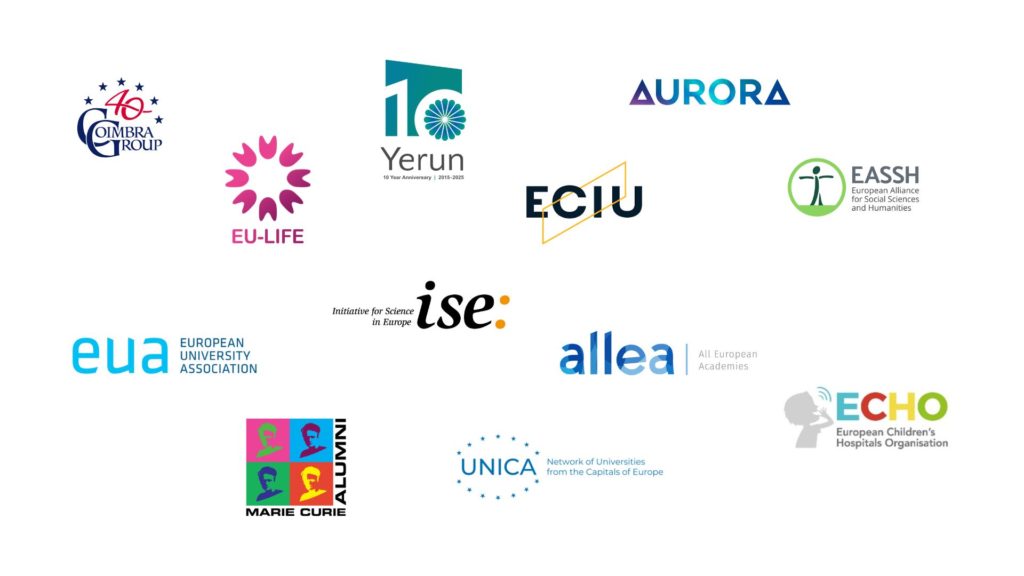
Read the full statement:
Giovanni Molari, Rector, University of Bologna
In celebrating its 40th anniversary, the Annual Conference and General Assembly of the Coimbra Group just held in Bologna (10-13 June 2025) constituted a great opportunity to highlight the relevance the network has for each institution involved, and jointly reflect on its mission, future and priorities.
Over the past four decades, the constant and intense interactions among our universities, between academics, staff, and students, have allowed us to broaden our perspectives, sharpen our views and increase our collective impact. Collaboration among member universities has taken many forms and directions and has favored the sharing of best practices not only within academic communities, but also in shaping relations with institutions and society at large.
The conference in Bologna followed the Climate Symposium held last March at Durham University, which culminated in the signing of the “Durham Declaration on Climate Change and Sustainability”. The event focused on the role universities can play in tackling climate change and proposing solutions to protect the environment. In the same spirit – that is, to reinforce the social responsibility of universities – a panel debate in Bologna featuring Rectors of Coimbra Group universities and Mayors of cities explored current and future approaches to “Empower Local and Global Communities”, promoting “Academic Cooperation for a Sustainable Global Future”.
Inter-institutional partnerships increase impact: by sharing interests and complementing expertise, we become stronger in pursuing our goals – both locally and globally, more effective in defending our values, and more beneficial to our communities. Far from standing on their own, universities are called to reinforce their mutual connections and reaffirm the importance of synergies with societies, for the benefit of present and future generations. In an increasingly fragile international scenario, strengthening the synergies between our universities and their home cities amplifies our voices and helps us prepare for future challenges.
As prominent universities, we are committed not only to excellence in education, research and innovation, but also to the idea that these goals are best achieved through cooperation in education, research and outreach – fostering an environment where peaceful interactions can take place. As long-established institutions, we are aware that excellence needs to be accompanied by inclusion, and transformative visions must be grounded in sustainability. In times when collaboration in research and education is under pressure, when conflicts and tension are increasing, where mobility and democratic values are being questioned, Coimbra Group universities have gathered to stress their mutual trust and trust in strong alliances between universities and their municipalities.
By empowering and working closely with our local communities, and by building bridges founded on European culture and academic values, we are increasingly called upon to make a difference worldwide.
Only by emphasizing that science and culture exist in —and for — society, by learning from one another, and by strengthening our connections, will we be able to look ahead and shape long-term visions. Only by continuing to integrate our academic communities and joining forces with society can we truly defend our shared values, pave the way for innovation and lead through inclusion. Only by openly and strongly affirming that tolerance, dialogue and peace are constitutive of academic activities, will we be able truly fulfill our goal of making a lasting difference, promoting responsible internationalization and facilitating multicultural relations through critical times.
Organising entities: Coimbra Group, Utrecht University, with support from the European Students’ Union (ESU)
The Coimbra Group together with Utrecht University are launching the 40th anniversary of the Coimbra Group closing event, 21 November (8h30 – 17h00), at the University Foundation, Rue d´Egmont 11, Brussels. The topic is: “Reinventing Campus Democracy: Bridging Divides and Advancing Solutions”.
Background
In a context of growing social and political tensions, both globally and within our own campuses, universities are increasingly called upon to serve as models of open dialogue, inclusive governance, and democratic resilience. However, recent events show the limits and challenges universities face in fulfilling this role.
This seminar aims to explore how universities can foster dialogue, navigate disagreement, and reinforce democratic principles on campus. The seminar is a step to bridge the gap between scholarly research and campus discourse and will revolve around methodological issues: What insights and examples do universities present to contribute to a viable and sustainable democracy? What principles and procedures does this require on campus?
Programme
Seminar including a series of keynotes and 6 interactive breakout sessions in two cycles of 3 parallel sessions.
• Keynote speeches:
- Henk Kummeling, former Rector, Utrecht University
- Věra Jourová, Vice-Rector for the Development of Human Resources and New Technologies, Charles University / former Vice President of the European Commission for Values and Transparency
• Address by Arno Schrooyen (Vice-President, European Students’ Union – ESU)
And more speakers tbc.
• Breakout sessions:
Six breakout sessions (divided in two cycles of three parallel sessions) will be organised, to discuss in an interactive format best practices and possibilities on the way in which debate happens on campus, relatively to topics relevant to CG universities. Three topics have already been identified, three more are left open for CG Universities and their students’ community to determine through an open call for contributions. Of these three slots, one will exclusively be determined by the students.
Topics:
- Geopolitical tensions and conflicts
- Neo-conservativism, neo-liberalism, wokeism: anti-democratic visions and polarisation within societies
- Climate change scepticism and anti-scientific sentiment
- Open for proposal (through the call for contributions launched)
- Open for proposal (through the call for contributions launched)
- Open for proposal (through the call for contributions launched, exclusively chosen by CG students)
More information?
For more information on the event, please visit this page. Registrations (upon invitation only) are now open at this link. The deadline for registrations is 24 October 2025. For accommodation recommendations and discounts, please contact info@coimbra-group.eu. The Call for Contributions (selection of breakout topic and nomination of expert) is open via email. The deadline is 1 September 2025.
Coimbra Group, together with EU-LIFE and YERUN, is launching a joint statement urging the European Commission to preserve the bottom-up and non-prescriptive structure of the Marie Skłodowska-Curie Actions (MSCA). The statement is currently supported by 17 leading research and innovation organisations.
The call responds to a recent proposal, in discussion with the member states, to introduce directionality in the MSCA 2026–2027 Work Programme by steering project calls toward predefined areas. Coimbra Group and the other signatories stress that MSCA’s success lies in its openness to all fields and topics, driven by researchers’ initiative and scientific excellence. Imposing thematic restrictions risks narrowing the scope of innovation and limiting opportunities for early-career researchers.
“Bottom-up is the essence of the MSCA actions and Coimbra Group has always been very clear about this, for instance in its recommendations to the Commission on the future orientations of MSCA in early 2024.” said Emmanuelle Gardan, Director of Coimbra Group. “There is no need to put energy into changes and new features in a programme that everyone is happy with – that is both popular and works well according to ALL stakeholders – with one exception, the continued low success rates. In a nutshell, do not change a winning a concept!”
MSCA in its current state already delivers significant contributions to strategic areas even before any political prioritisation is envisioned. More than 1,000 ongoing projects focus on artificial intelligence, backed by nearly €1 billion in EU funding under Horizon 2020 and Horizon Europe. Over 170 projects address quantum technologies, and thousands of MSCA researchers are involved in work related to the EU Missions.
Also notable is that the demand for MSCA continues to grow, while the budget has seen only marginal increases between funding cycles. While the primary message is about preserving MSCA’s model, the signatories also encourage a significant funding boost in the next Framework Programme (FP10) to match the programme’s expanded impact and address the structural challenges that research careers face.
The joint statement is currently supported by: ALLEA, Aurora Universities Network, CESAER, Coimbra Group, EASSH, ECIU, EU-LIFE, EUA, Eurodoc, Initiative for Science Europe (ISE), LERU, MCAA, PolSCA, SPARC Europe, SSH-council of the Netherlands, The Guild, UNICA, Young Academy of Europe (YAE), and YERUN.
Any other organisation wishing to support this initiative is welcome to help raise awareness by sharing the statement.
Download the full statement:
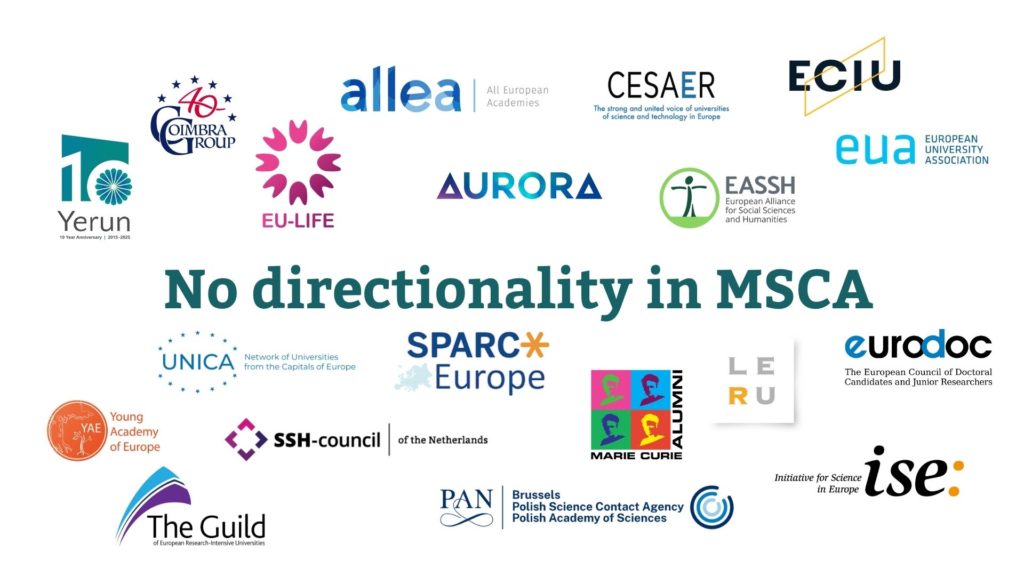
Coimbra Group Annual Conference and General Assembly 2025
Alma Mater Studiorum – Università di Bologna
The University of Bologna hosted the Coimbra Group Annual Conference and General Assembly, 10-13 June 2025. This year’s event held special significance, marking the 40th anniversary of Europe’s oldest university network. Under the theme “Forty Years of Impact: Universities and Cities Shaping a Sustainable Future”, the conference brought together more than 300 delegates from the Coimbra Group’s member universities to reflect on the past, celebrate achievements, and chart a path forward toward sustainability, inclusion, and global engagement.
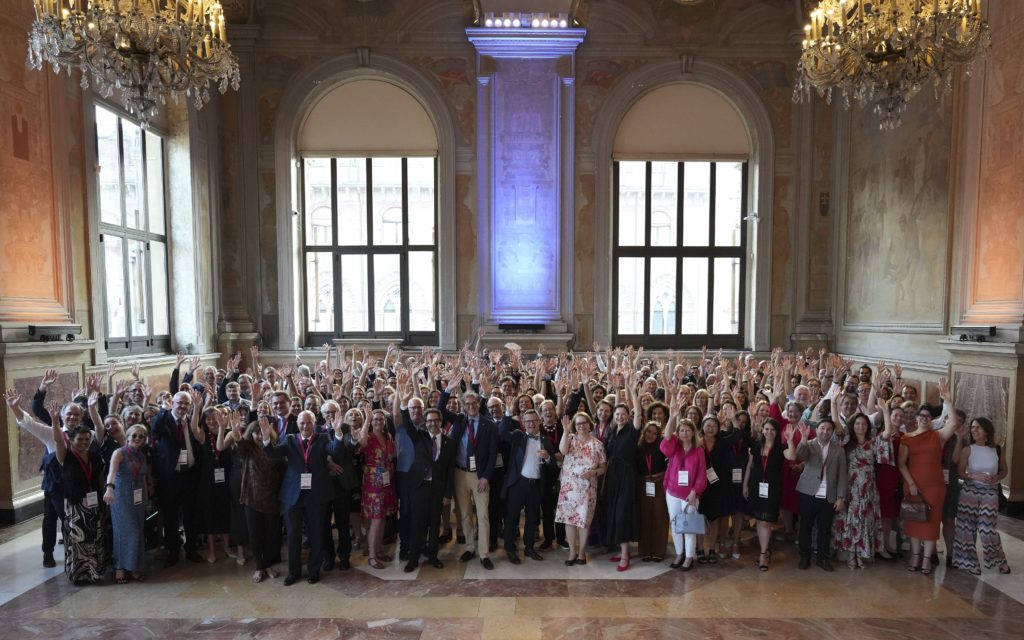
Working Groups: Foundations for Collaboration and Innovation
The event opened with the Working Groups’ meetings. All twelve Working Groups met to advance their ongoing activities, share updates on recent developments, and plan future activities. These meetings typically serve as vibrant platforms for cross-university collaboration, community building, and the development of joint projects and shared initiatives.
Some Working Group held elections and therefore we address our best wishes to:
– Francesco de Anna (University of Würzburg), reconducted as Chair of the STEM Working Group, with Giulia Licini (University of Padua) as Vice-Chair.
– Chantal Riccardi (Universityof Pavia) for the second mandate ahead of the Academic Exchange & Mobility Working Group, with Daniela Sauge (University of Geneva) as Vice-Chair.
– Siobán O’Brien Green (Trinity College Dublin) for her election as Chair of the Equality & Diversity Working Group, with Iveta Bayerová (Charles University) as Vice-Chair.
– François Lecellier as the new Chair of the Education Innovation Working Group, and Vanessa Viganò (University of Montpellier) as Vice-Chair.
– Ilaria Poggiolini (University of Pavia), elected new Chair of the Social Sciences & Humanities Working Group, with Balázs Apor (Trinity College Dublin) as Vice-Chair.
The groups play a vital role in shaping the Coimbra Group’s collective research agenda and policy development across a wide range of fields. For an overview of all 12 Working Groups please visit this webpage.
Book launch: “European University Legacies: Problematic Heritage and Contemporary Practices”
One of the intellectual highlights of the week was the launch of the book “European University Legacies: Problematic Heritage and Contemporary Practices” (Edinburgh University Press), led by the Heritage Working Group. Edited by Peter Bille Larsen (University of Geneva) and Markéta Křížová (Charles University Prague), the volume critically examines the complex and sometimes uncomfortable legacies of European universities.
Emerging from two collaborative workshops, and featuring contributions from 14 institutions, the book addresses themes such as colonial histories, restitution, symbolic justice, and the entanglements of universities with power structures past and present. The publication reinforces the Coimbra Group’s commitment to open, critical, and constructive engagement with university heritage and social responsibility.
Public Sessions: Digital Heritage, Local Partnerships for Global Impact, and Decolonisation
Open to a broader audience and live-streamed for accessibility, several thematic sessions led by Working Groups explored complex challenges currently facing universities.
A joint session between the Heritage Working Group and the Una Europa European University Alliance titled “Digital Heritage and the University” addressed the evolving role of digital tools in preserving and interpreting academic and cultural heritage. This was followed by the session on “Decolonising University Heritage”, which delved into the tensions between tradition and equity, offering pathways for institutions to confront historical legacies while embracing pluralism and change.
Meanwhile, another session, organised by the Global Partnerships Working Group, “University and Local Authorities: Global Partnerships in Action”, showcased innovative models of collaboration between universities and municipalities across Europe with global impact.
Erasmus Student Network meeting with the Coimbra Group Universities
This interactive meeting brought together representatives of Coimbra Group universities and volunteers of the Erasmus Student Network to strengthen collaboration between the two organisations. Following presentations of the Coimbra Group’s Durham Declaration, the key findings of the XV ESN Survey, and ESN’s welcome activities and student integration efforts, participants split into smaller groups to clarify their respective expectations regarding collaboration, identifiy opportunities for joint initiatives and student engagement, and align their efforts to improve the quality of support for international students at their universities.
How to handle the social responsibility within the European Universities Alliances? – Open Session on the European Universities Alliances (EUAs)
During the annual Open Session on the EUAs, representative from each of the eight Alliances involving CG Universities presented a concrete initiative illustrating how their Alliance has dealt with social responsibility. They highlighted the impact of their initiative as well as the challenges their Alliance has faced or is currently facing in this effort. Susanne Conze, Head of Unit for Higher Education at the European Commission, then reacted to the presentations, emphasizing the crucial role universities play as actors of societal change within their communities. She also reiterated the European Commission’s support for the Alliances.
Watch the replay here.
Climate and Sustainability Commitments: A Shared Declaration
The keynote speech by Andrea Rinaldo, Stockholm Water Prize Laureate, titled “Reflected in Water: Development, Resilience, Inequalities”, offered an urgent call to address global water challenges and their deep links to inequality and climate justice. His lecture set the stage for the Conference on Climate Change: “From Durham to Bologna; the Durham Declaration”. Building on the Durham Declaration on Climate Change and Sustainability, Durham University and the Coimbra Group presented a roadmap to transform these commitments into action, complemented by reflections from the Rectors of the University of Turku and Utrecht University.
Drawing from the legacy of the Poitiers Declaration (2016), the Durham Declaration firmly places sustainability at the core of the Coimbra Group’s mission moving forward.
Empowering Communities: From Local Impact to Global Engagement
Giovanni Molari, Rector of the University of Bologna, opened the session, followed by addresses from Roxana Minzatu, European Commission’s Executive Vice-President for Social Rights and Skills, Quality Jobs and Preparedness, and Isabella Conti, Regional Councillor for Welfare and Education of Emilia-Romagna. All three speakers emphasized the transformative power of collaboration between universities and local and regional authorities.
The session was followed by a keynote speech by Kum Kum Bhavnani (University of California, Santa Barbara) on “Global Shifts, Innovative Futures: shaping inclusive excellence“, introduced by Raffaella Campaner, Vice Rector for International Relations. Student Ambassadors Onyekachi Kizito Ugwu and Aiswarya Varadarajan Nair, also contributed to the discussion
This theme continued in the panel discussion, “Empowering Local and Global Communities: from the Poitiers Declaration to the Future”, featuring mayors, rectors, and regional leaders. Together, they explored how universities and cities can collaborate to co-create solutions for sustainable development and enhance civic well-being.
Spotlight on Future Researchers: 3MT Final and Early Career Voices
A lively highlight of the conference was the final round of the Coimbra Group’s Three Minute Thesis (3MT) Competition, which has become a signature event celebrating doctoral excellence and science communication.
This year’s winner, Almudena Moreno-Borrallo (Trinity College Dublin), captivated the jury and audience with her pitch on “Triggering Healing: Materials that Outsmart Brain Cancer”. Bianca Brandl (University of Graz) and Uffe Kjærgaard (Aarhus University) also delivered impressive presentations on “Personalized Medicine – Health for Every Body” and “Looking Inside the Liver: Unveiling Cancer’s Metabolic Fingerprint”.
This initiative, coordinated by the Doctoral Studies Working Group, showcases the Coimbra Group’s investment in the next generation of researchers and its commitment to accessible and impactful science. Learn more about this edition and watch the replay here.
Inclusive, International, and Responsible Universities
The closing sessions focused on critical strategic themes, including the evolving responsibilities of European University Alliances and the importance of institutional self-reflection. One session, titled “Is Your University Truly Inclusive and International?”, and organised by the EUNIVERSE project, prompted an open and sometimes provocative dialogue on structural inclusion, international cooperation, and the challenges of embedding equity into university systems.
These conversations reaffirmed the Coimbra Group’s commitment to being not only a network of academic excellence but also a community of institutions committed to social justice and institutional transformation.
Looking Ahead: New Members and Renewed Governance
The General Assembly voted to formally welcome three new members to the network: University of Leeds, Newcastle University, and University of Wroclaw, further enriching the Coimbra Group’s diversity and reach. Their integration marks a new chapter in the network’s evolution and reinforces its shared vision of inclusive, research-led, and socially engaged higher education.
The Assembly also confirmed the new Executive Board through a series of votes. Daniel Donoghue (Durham University) was re-elected for a third term, while Beatrix Busse (University of Cologne) and Coco Norén (Uppsala University) secured second mandates, and Nicoleta Popa (Alexandru Ioan Cuza University) was elected for her first. Busse and Donoghue will serve respectively as Vice-Chair and Treasurer. Giovanni Molari, Rector of the University of Bologna, was named Honorary President, succeeding Marjo Kaartinen.
In the Rectors’ Advisory Group, Karen O’Brien (Durham University) joined as a new member, alongside returning rectors from Charles University and the University of Barcelona.
A Celebration of Shared Values and Common Purpose
A deeply moving moment came with a letter from the Jagiellonian University, one of the Coimbra Group’s founding members. The letter celebrated 40 years of the network’s commitment to solidarity, civic responsibility, and collective action in service of society. It reminded delegates of the Coimbra Group’s enduring mission – to advance academic freedom, intercultural understanding, and innovation in higher education.
The 2025 Annual Conference in Bologna was not only a celebration of four decades of impact, but also a forward-looking gathering that reaffirmed the network’s commitment to shaping a more inclusive, sustainable, and collaborative future for universities and their communities.
As we look ahead, please save the date for our 2026 Annual Conference & General Assembly, which will take place in Granada from 16 to 19 June 2026 – we look forward to seeing many of you there! We are also delighted to hold the Coimbra Group 40th anniversary closing event, co-organised with Utrecht University, which will take place on 21 November 2025 (8:30–17:00) in Brussels, under the topic: Reinventing Campus Democracy: Bridging Divides and Advancing Solutions.
Photo Gallery
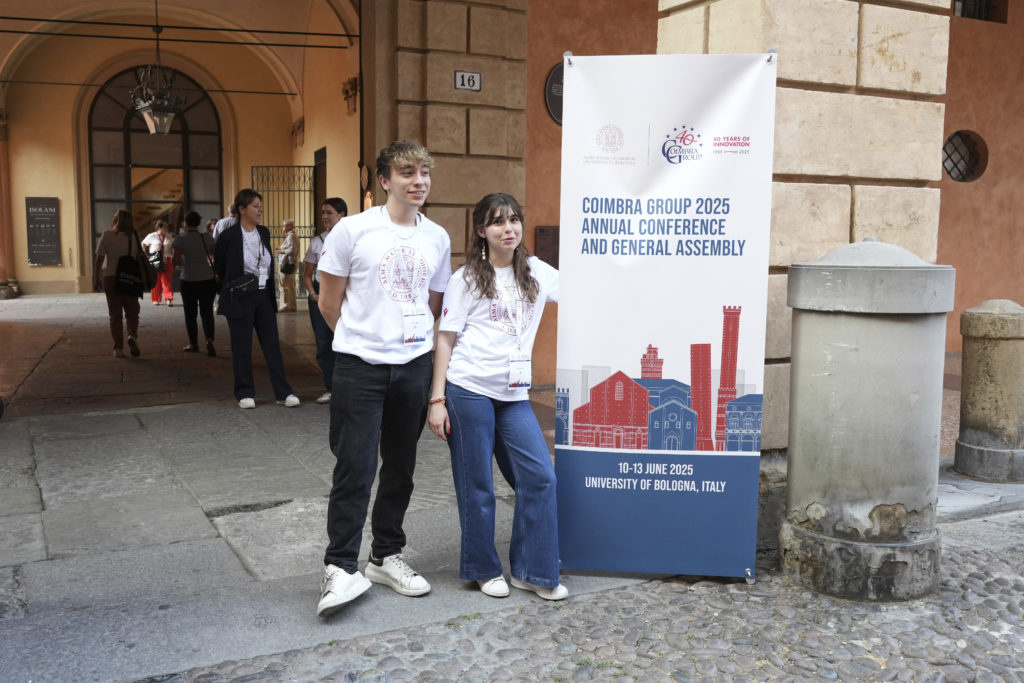
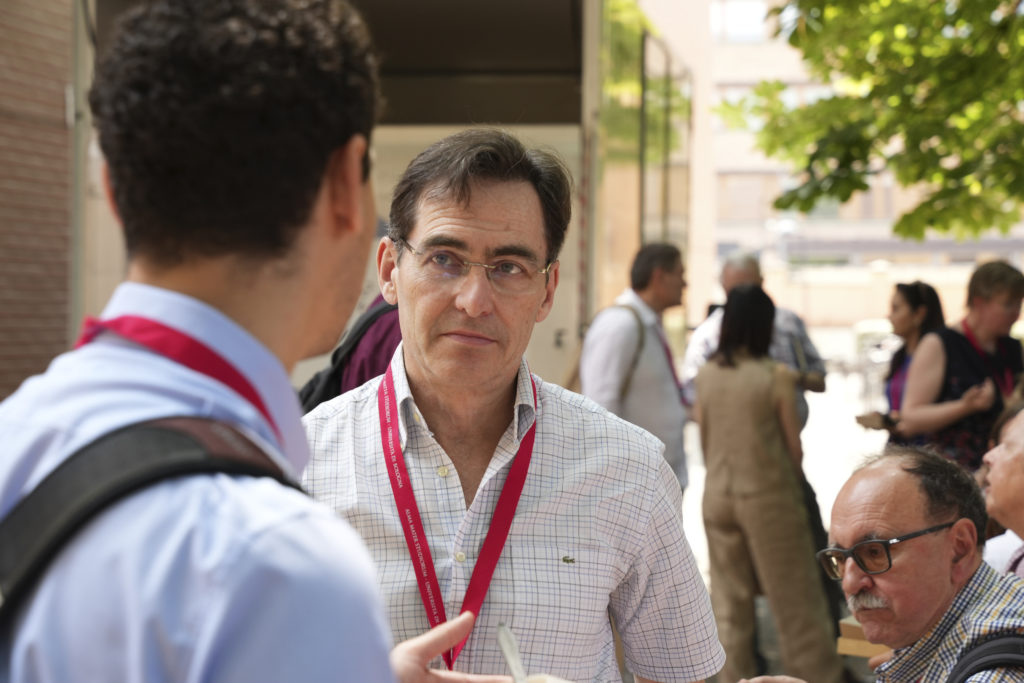
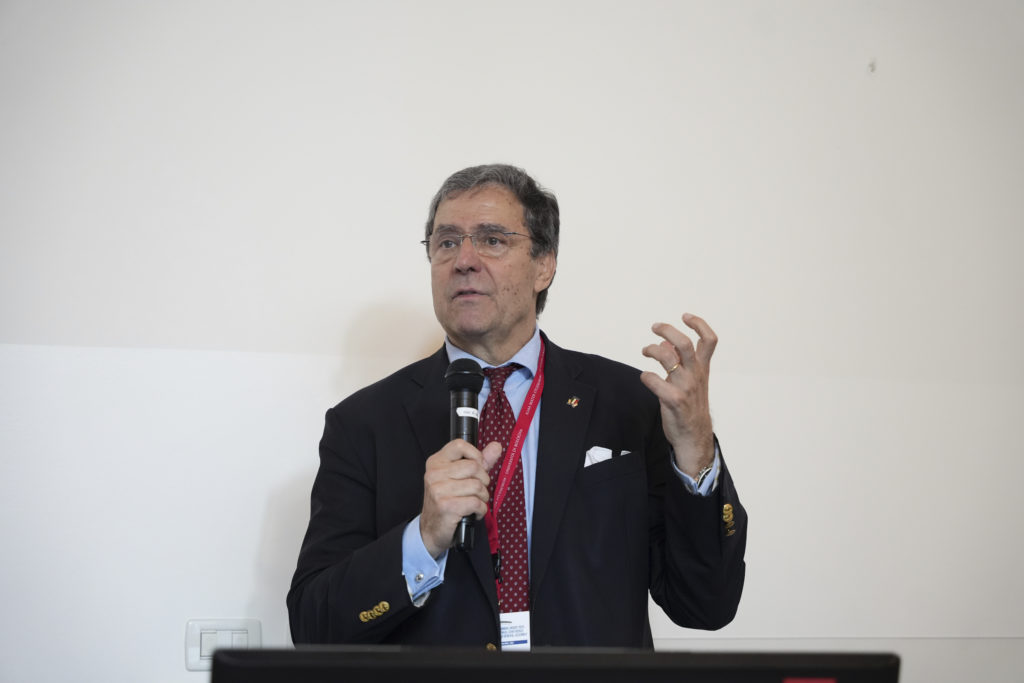
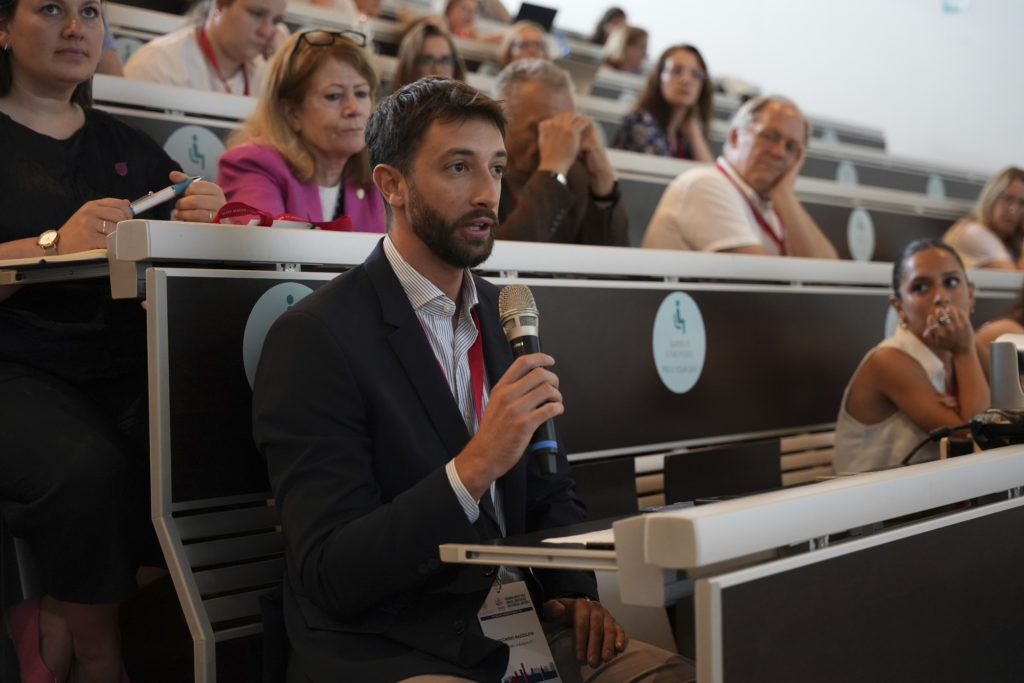
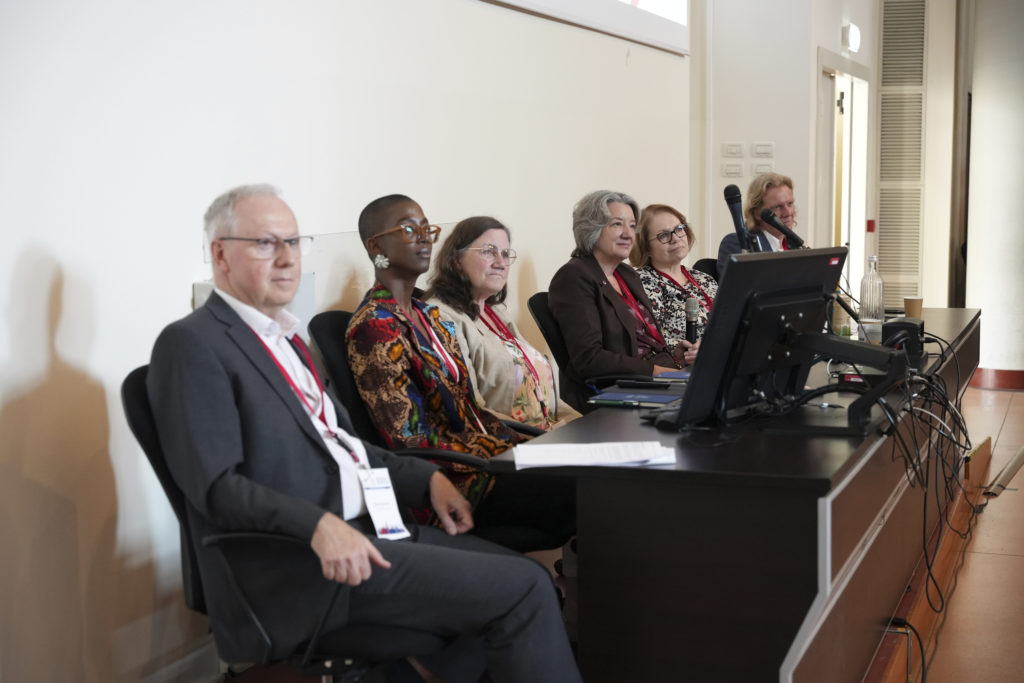
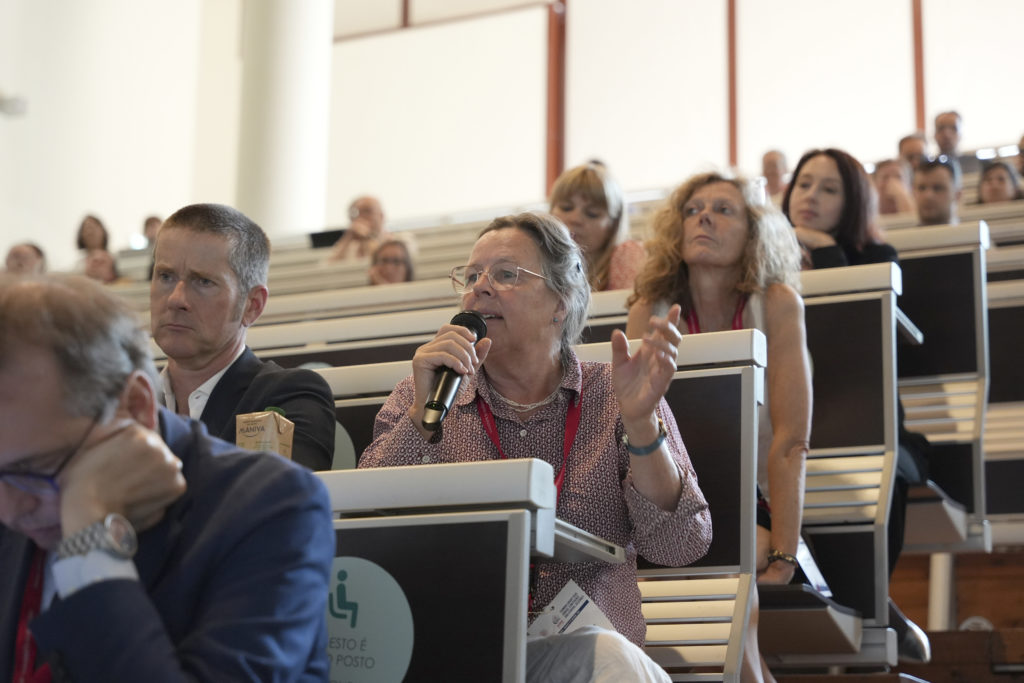
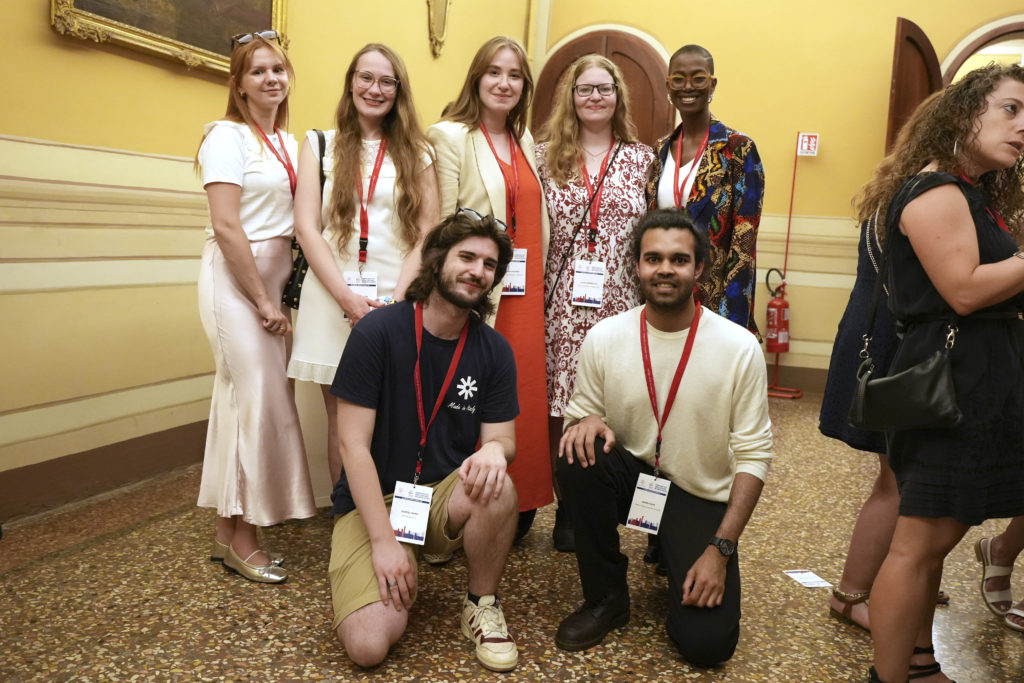
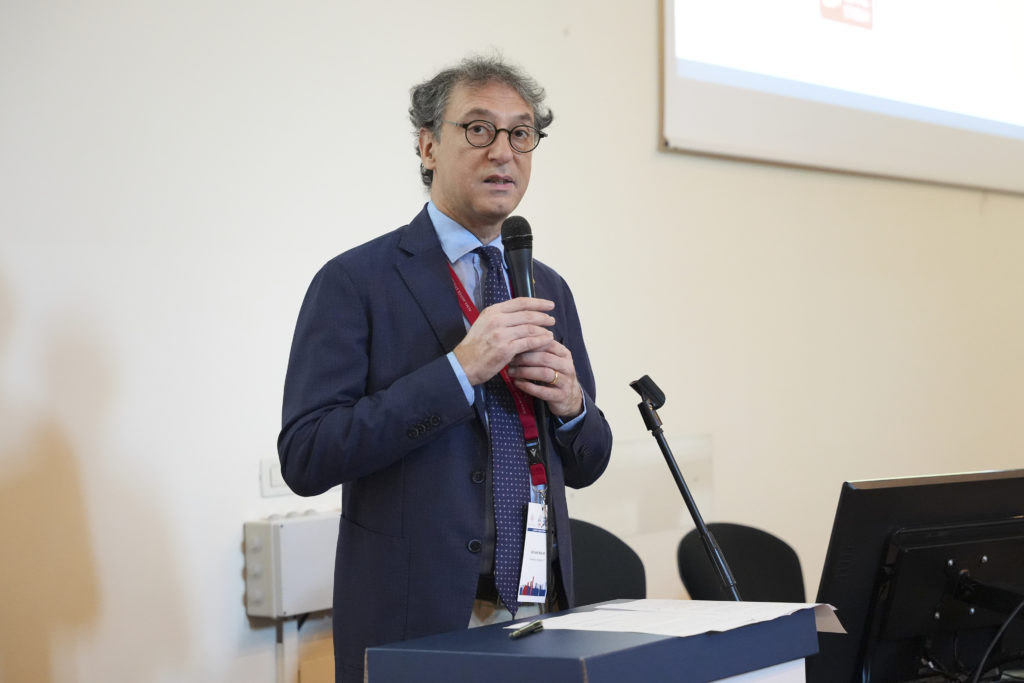
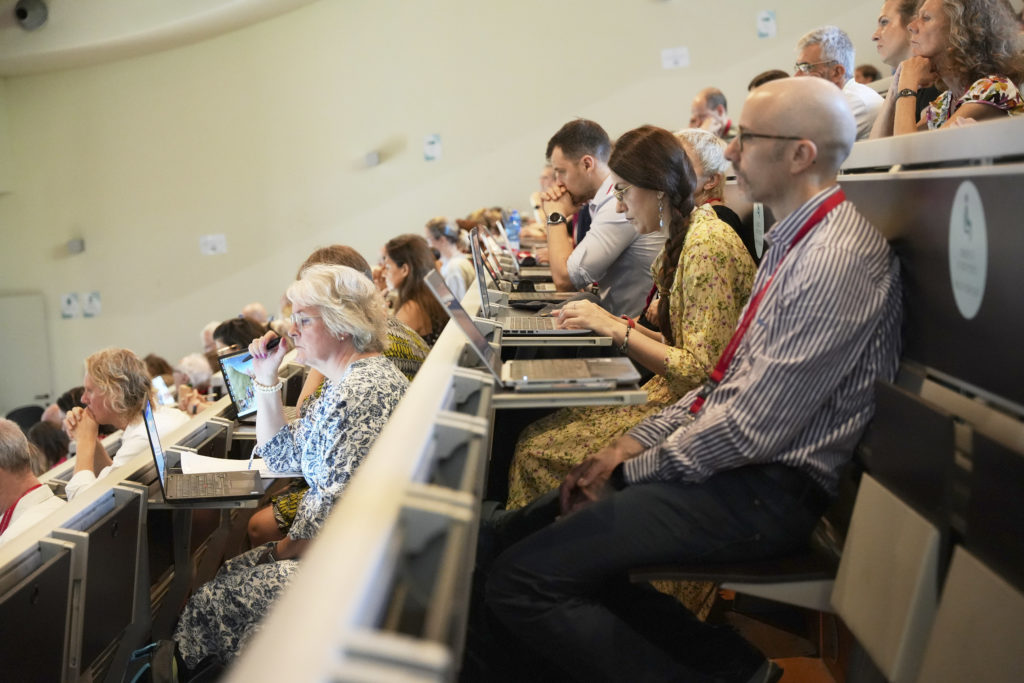
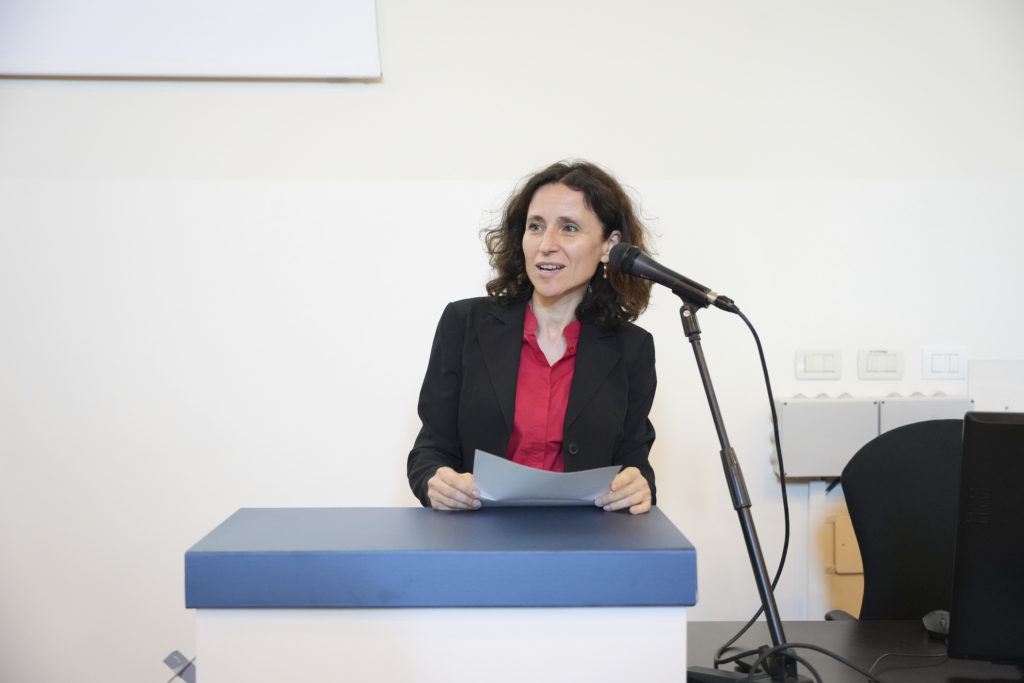
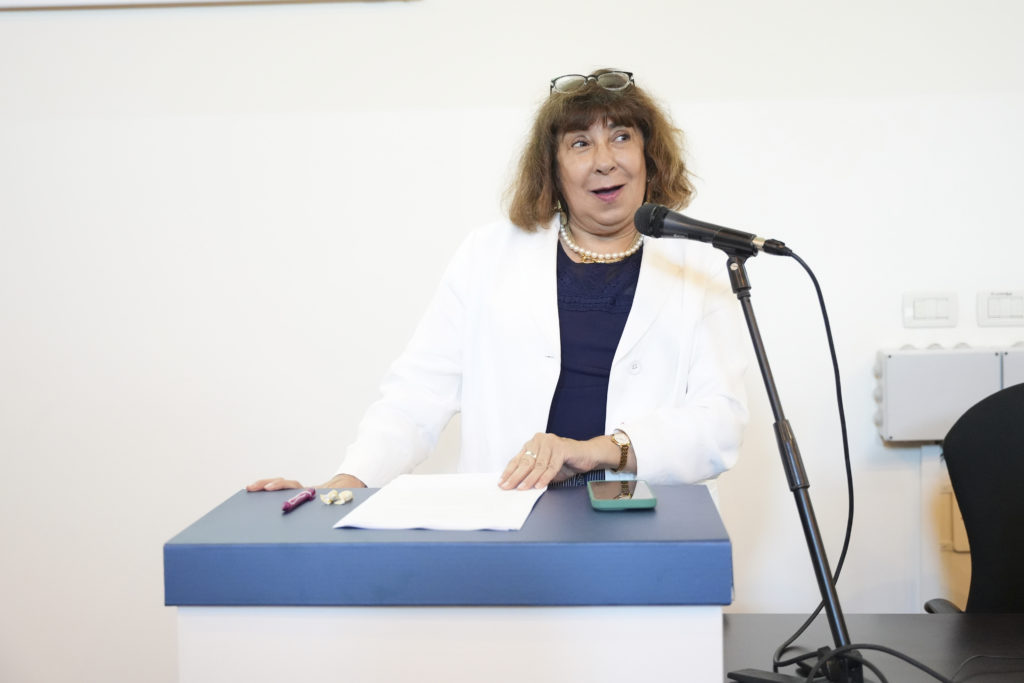
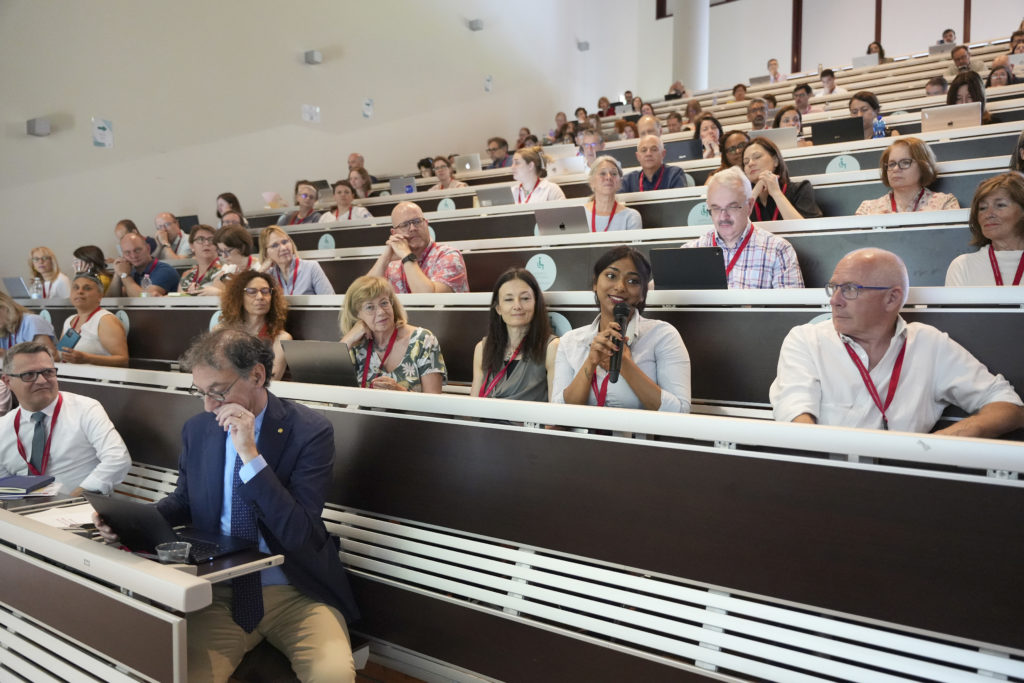
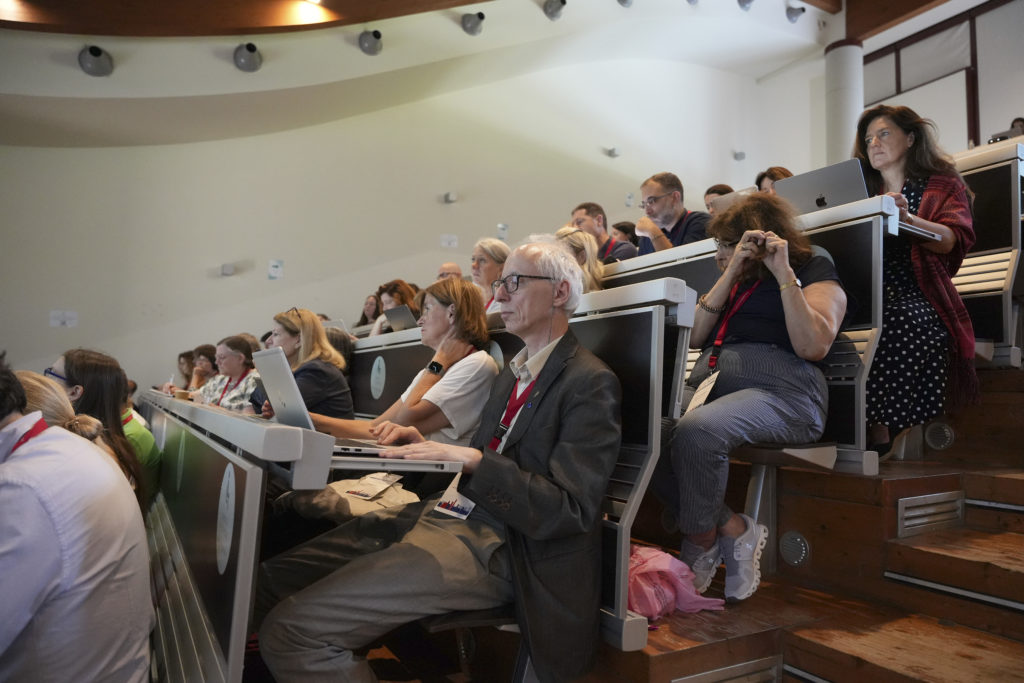
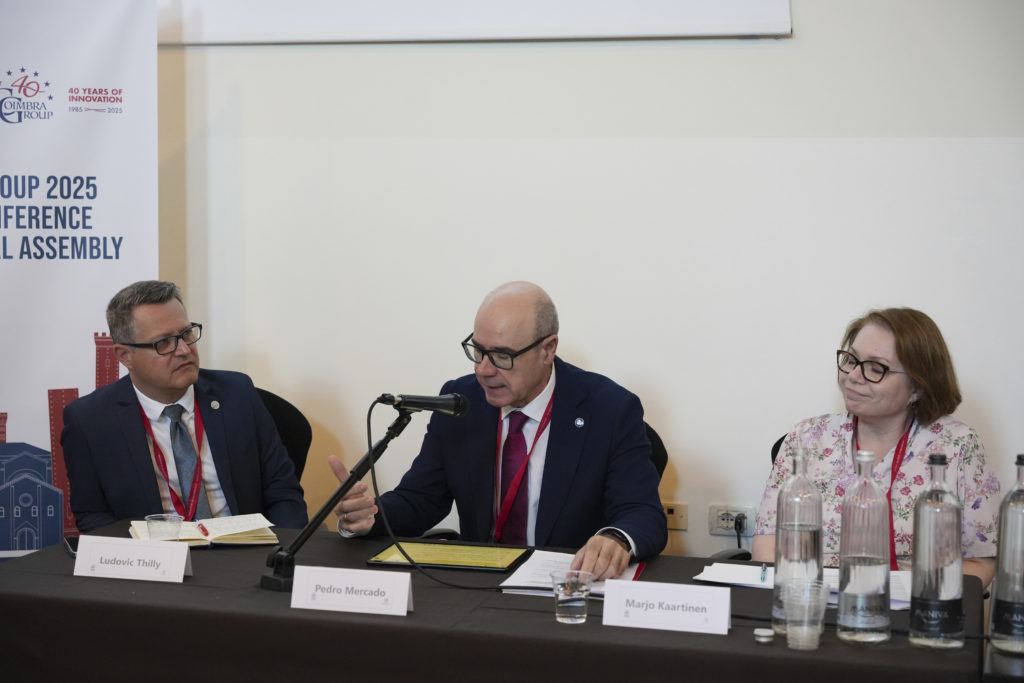
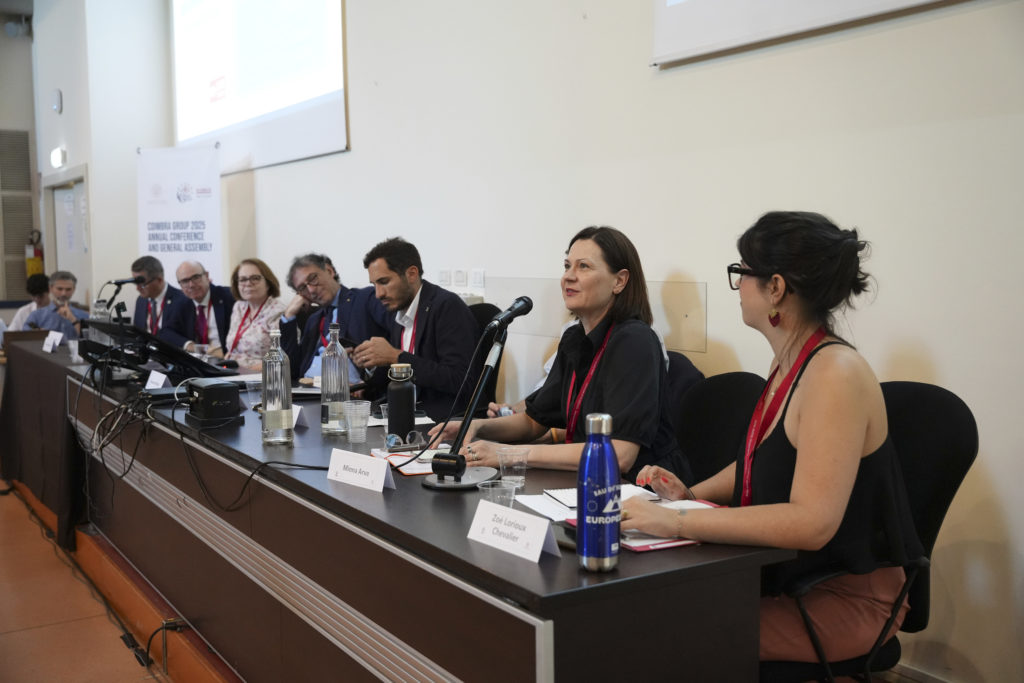
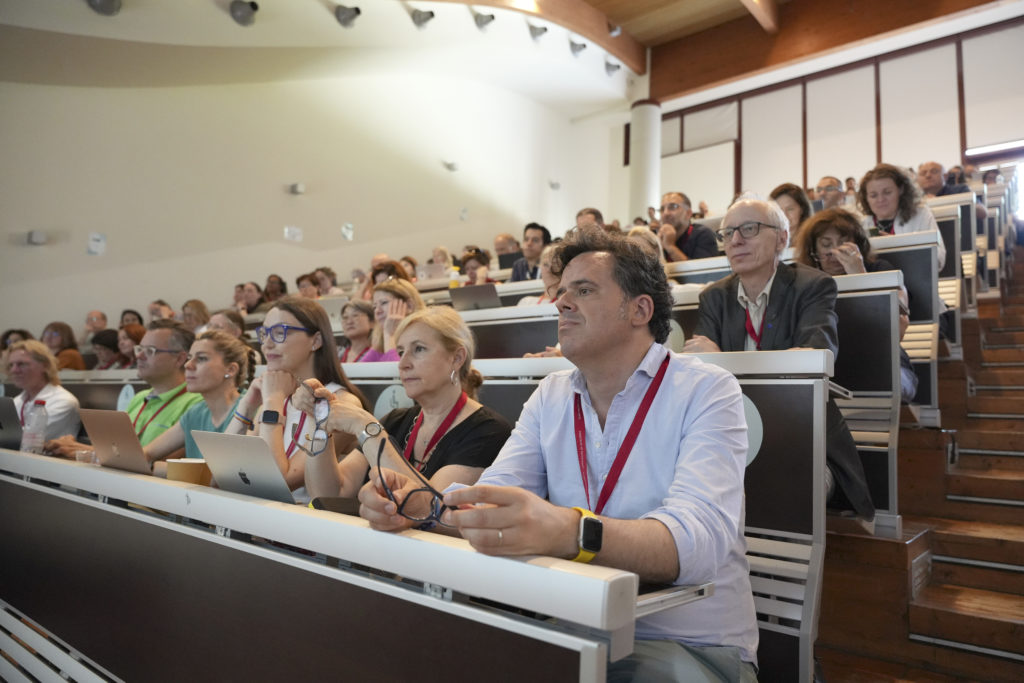
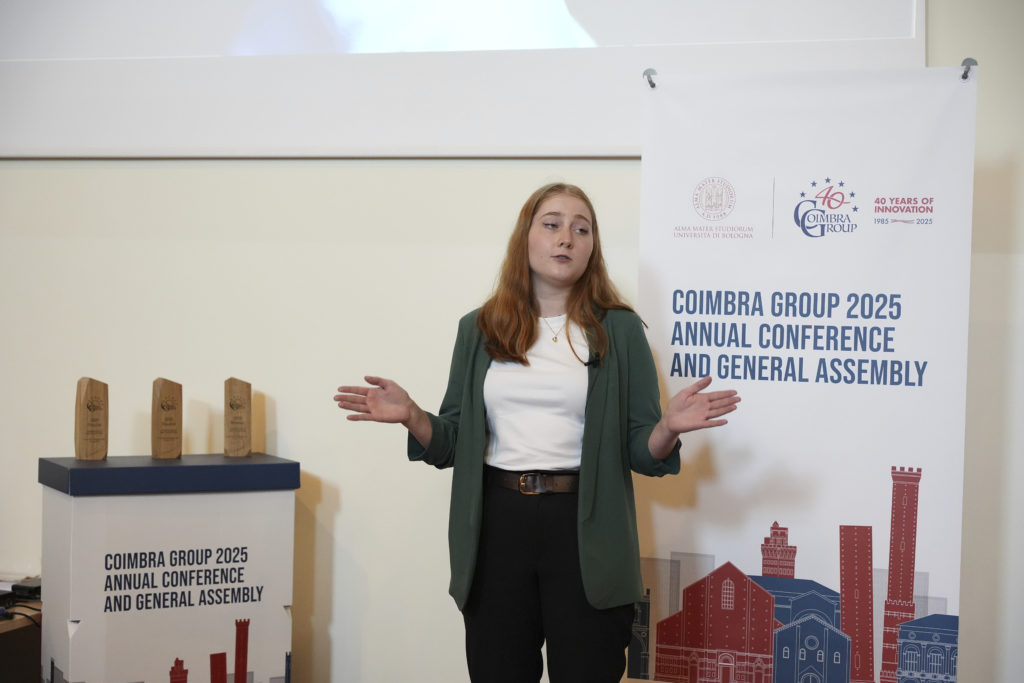
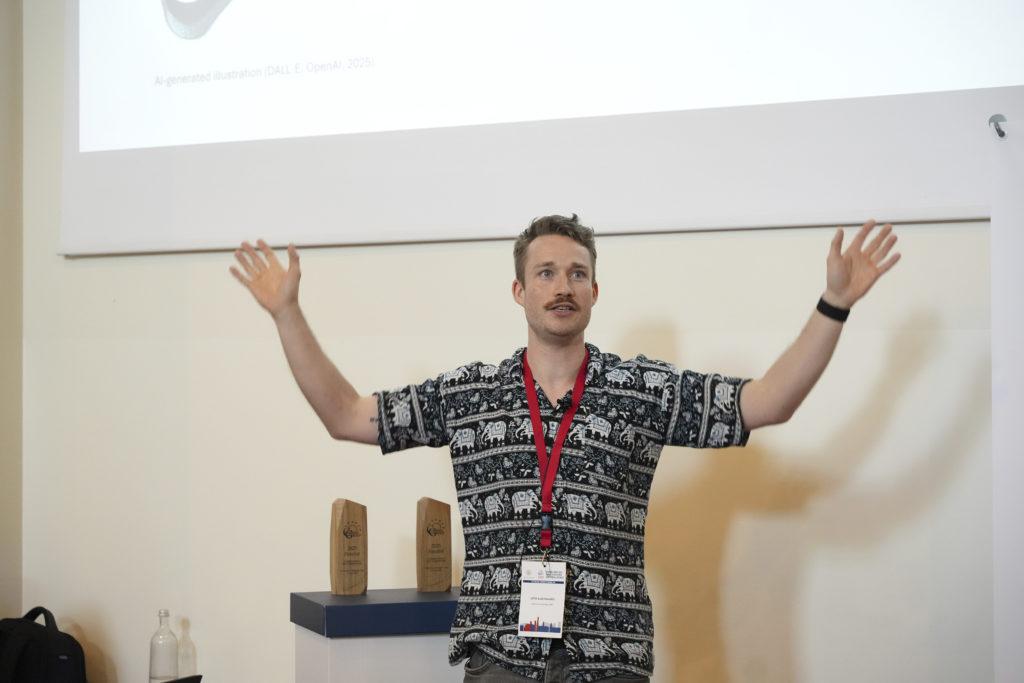
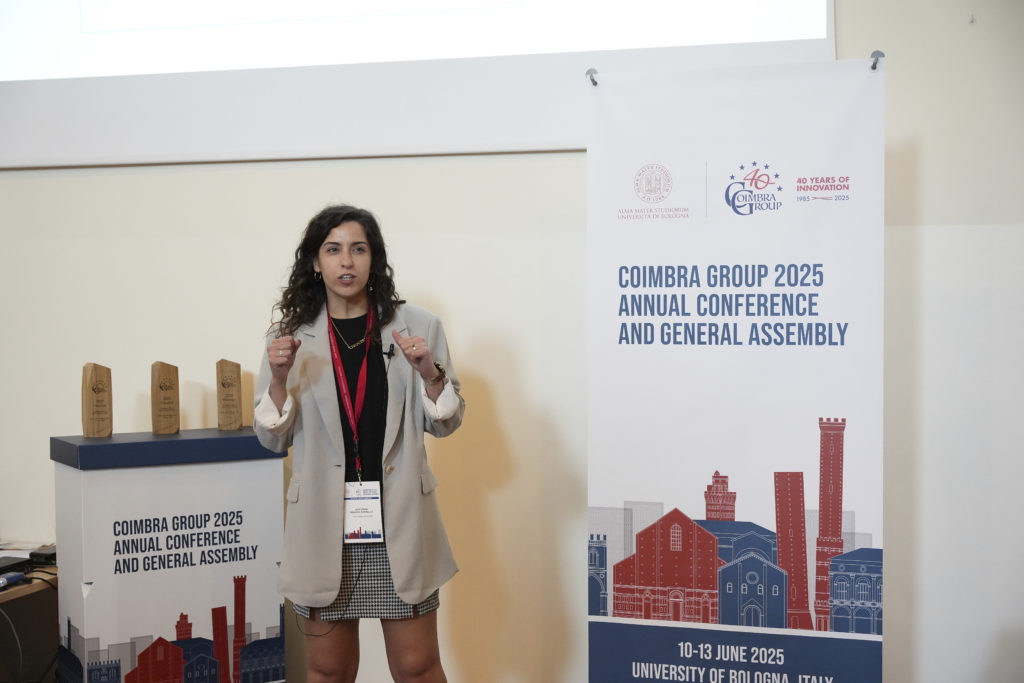
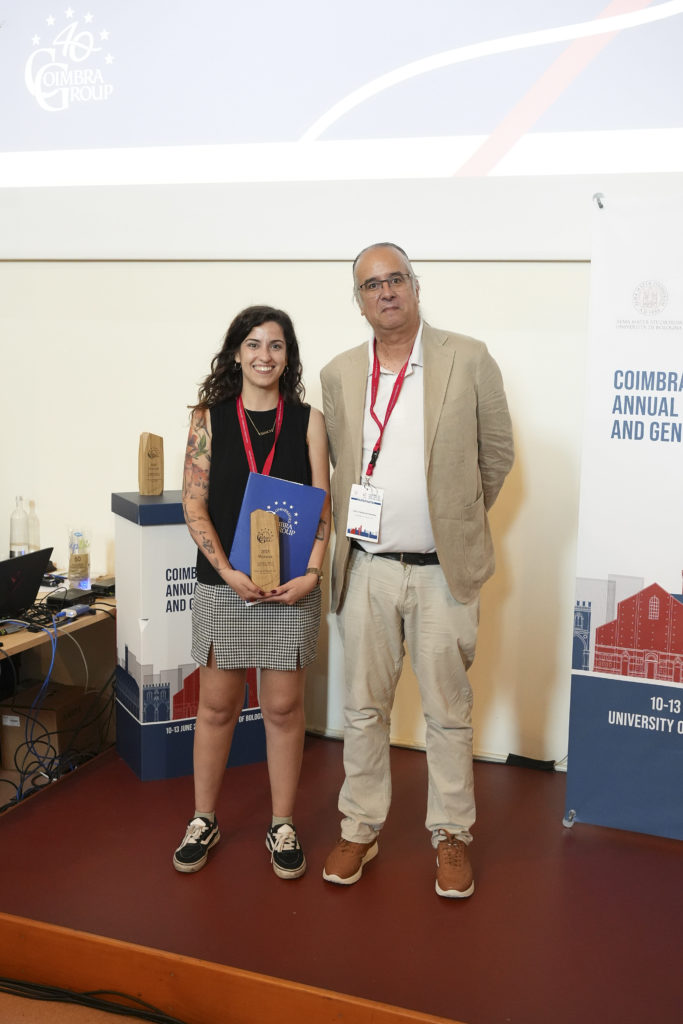
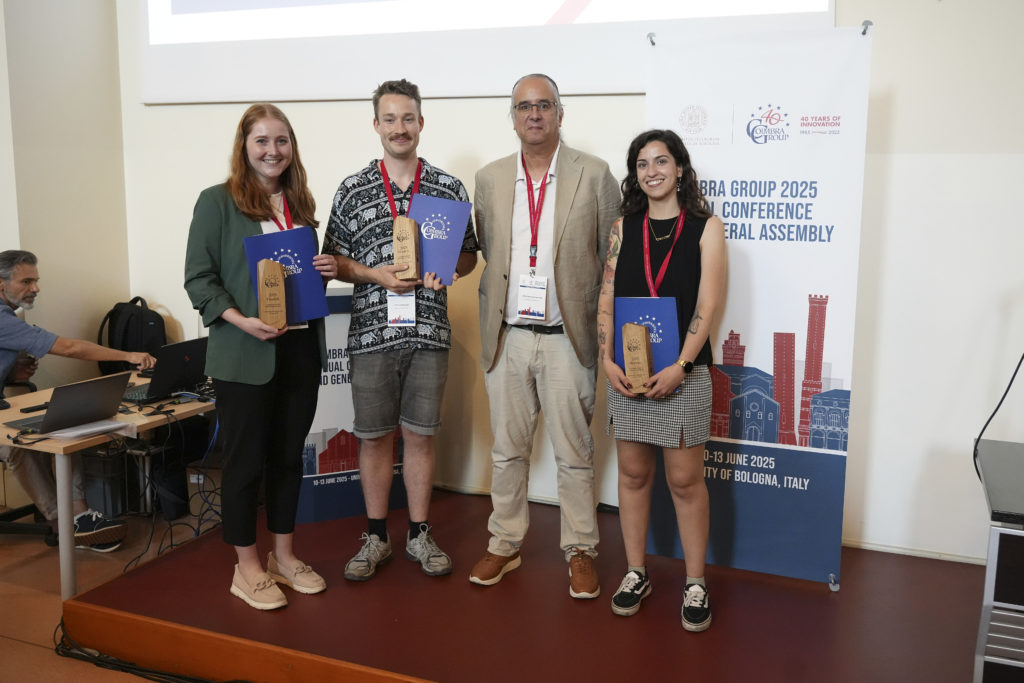
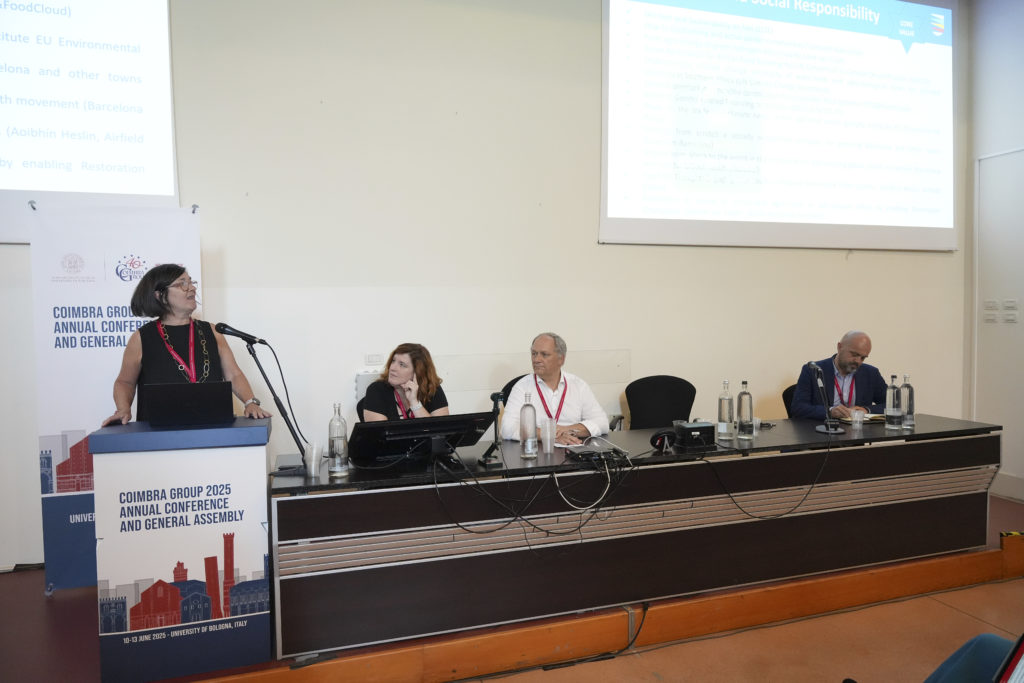
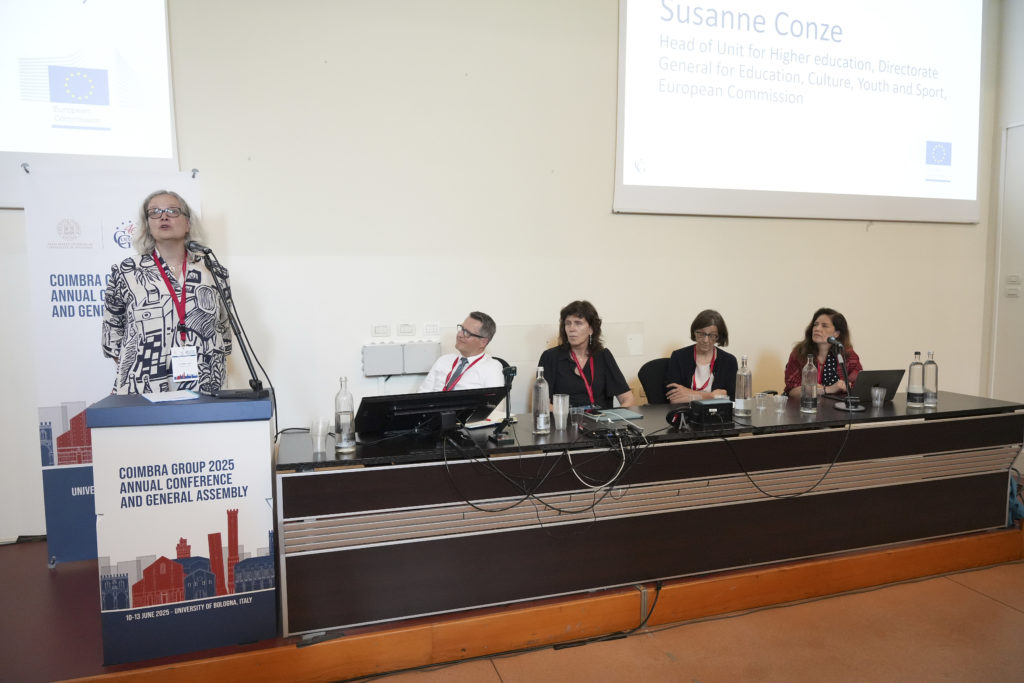
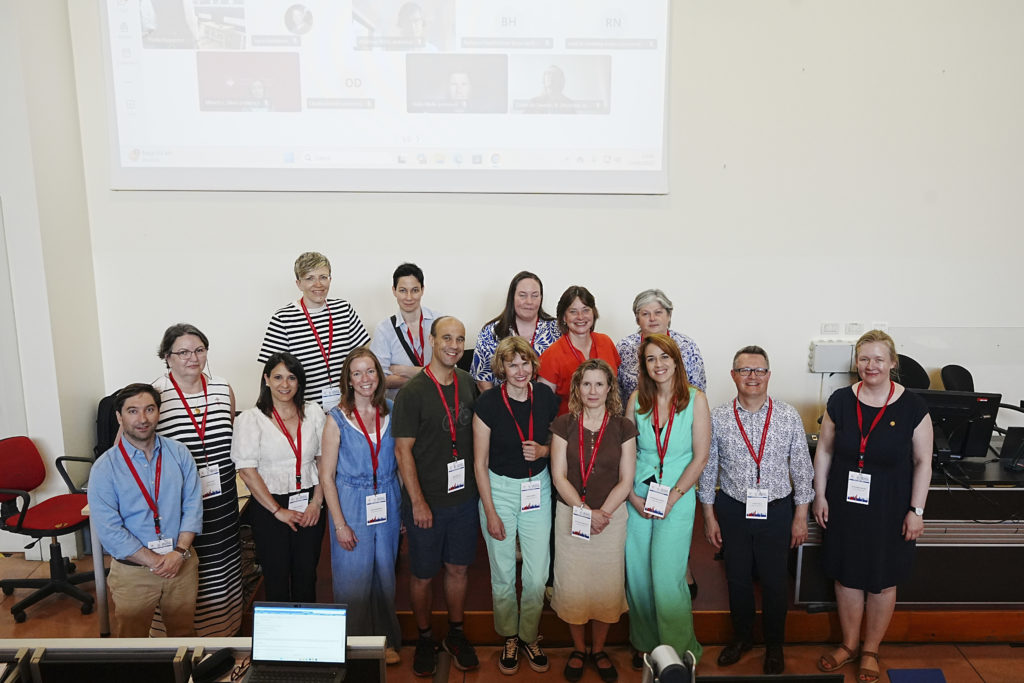
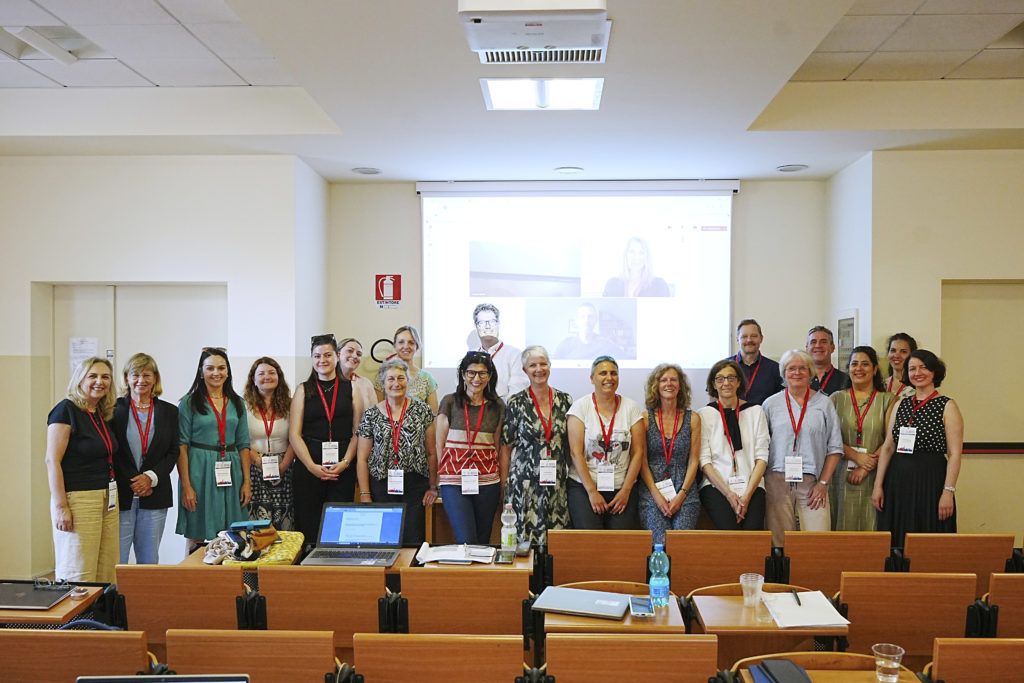
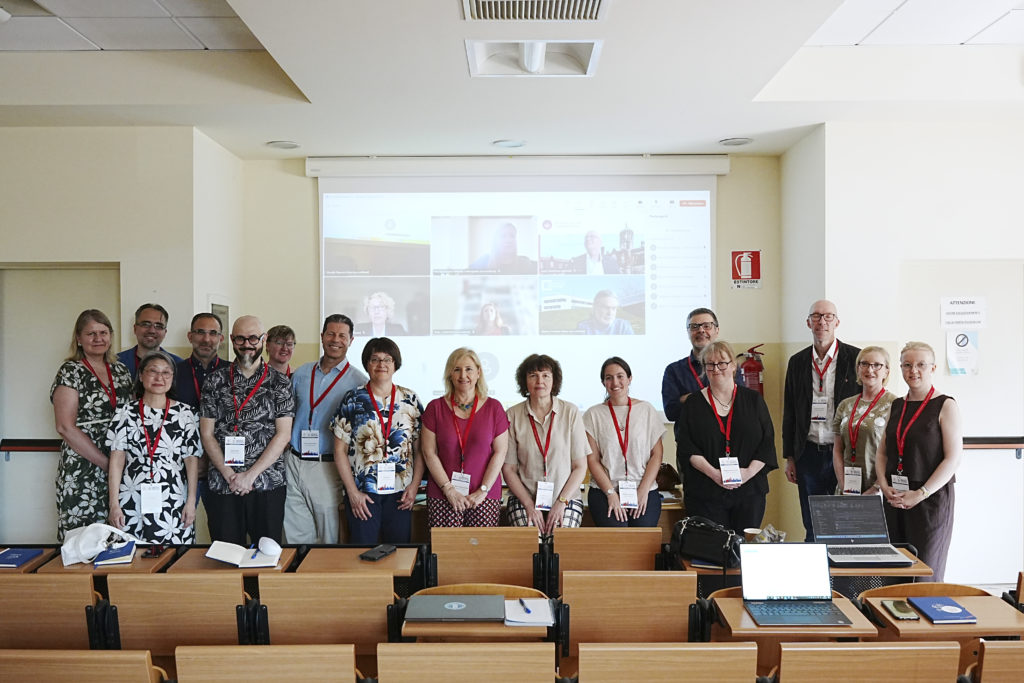
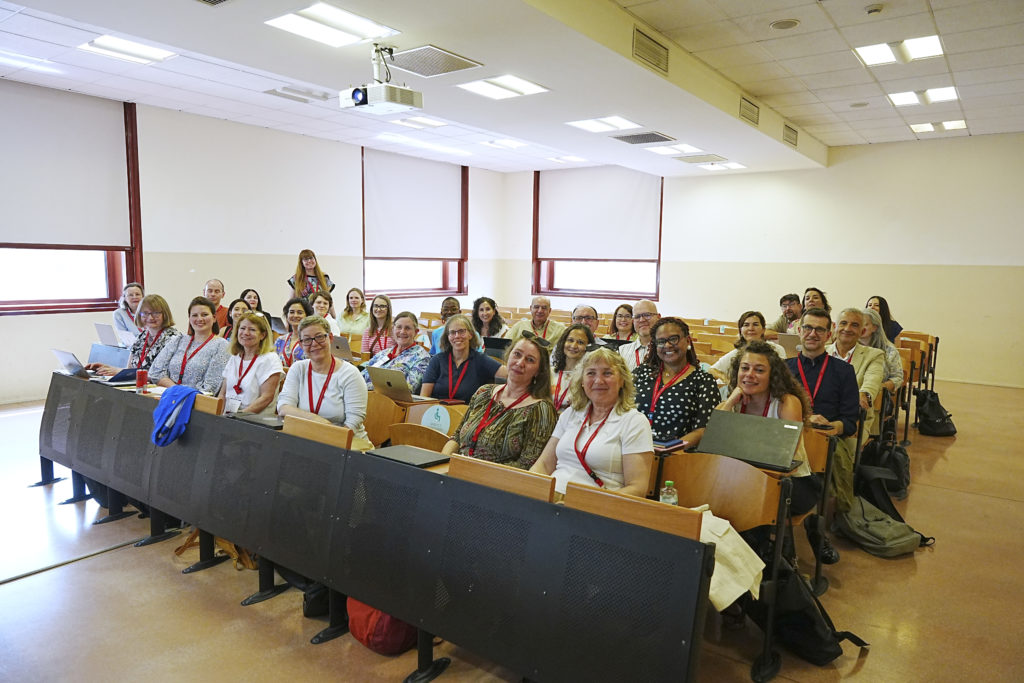
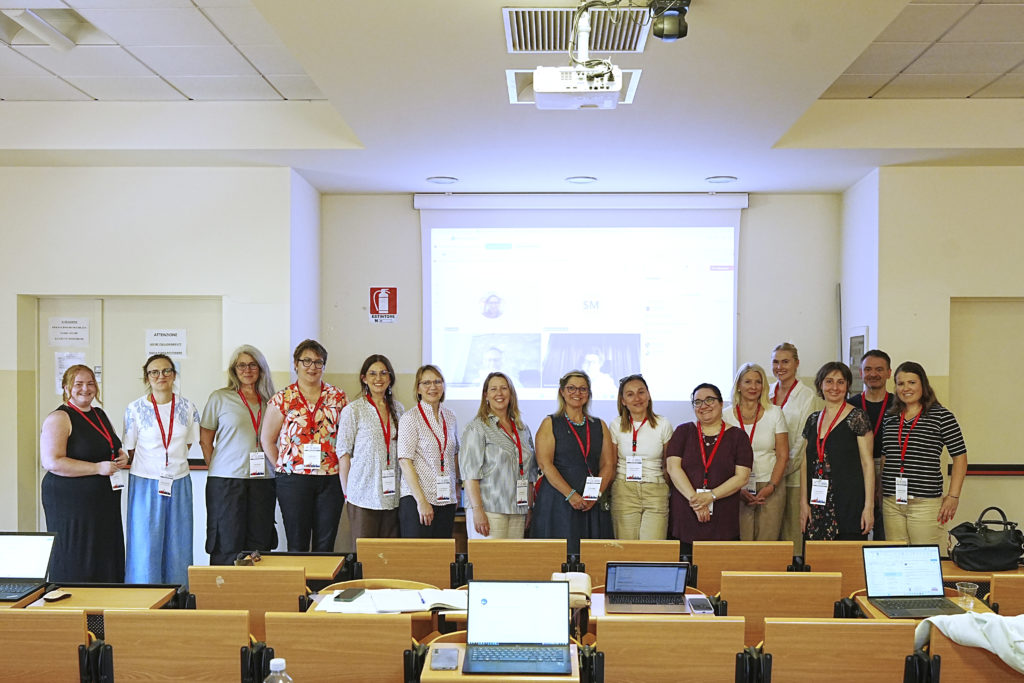
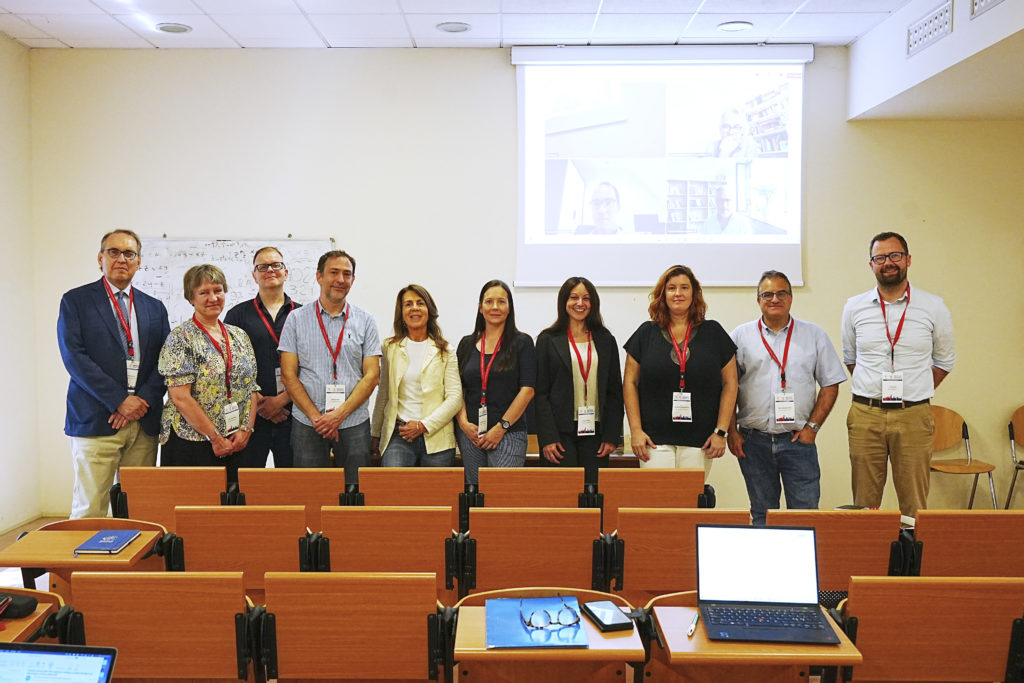
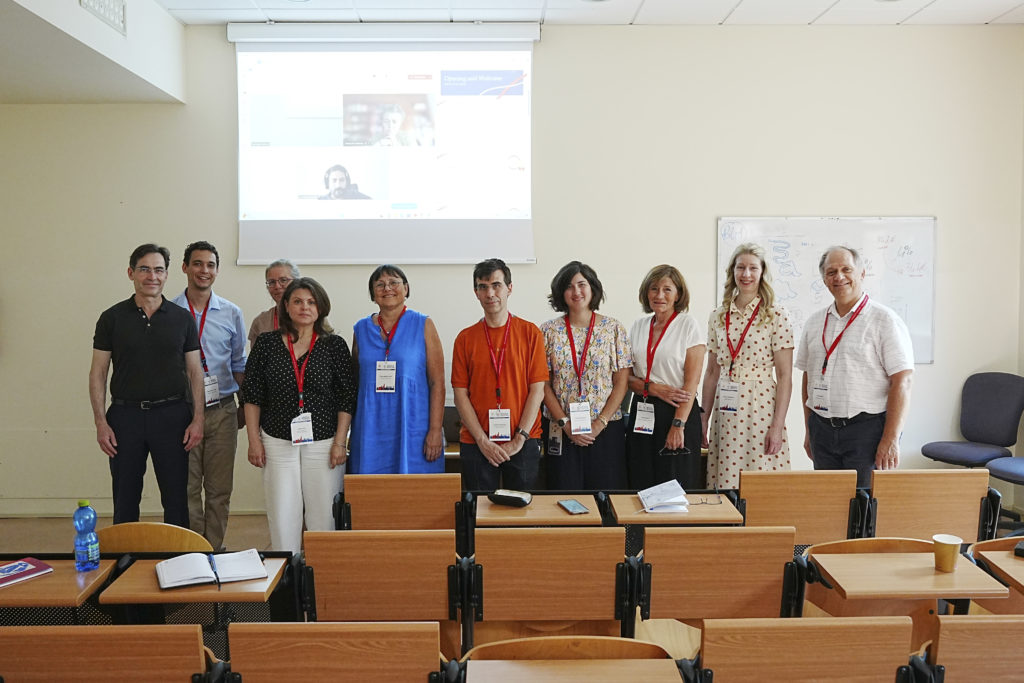
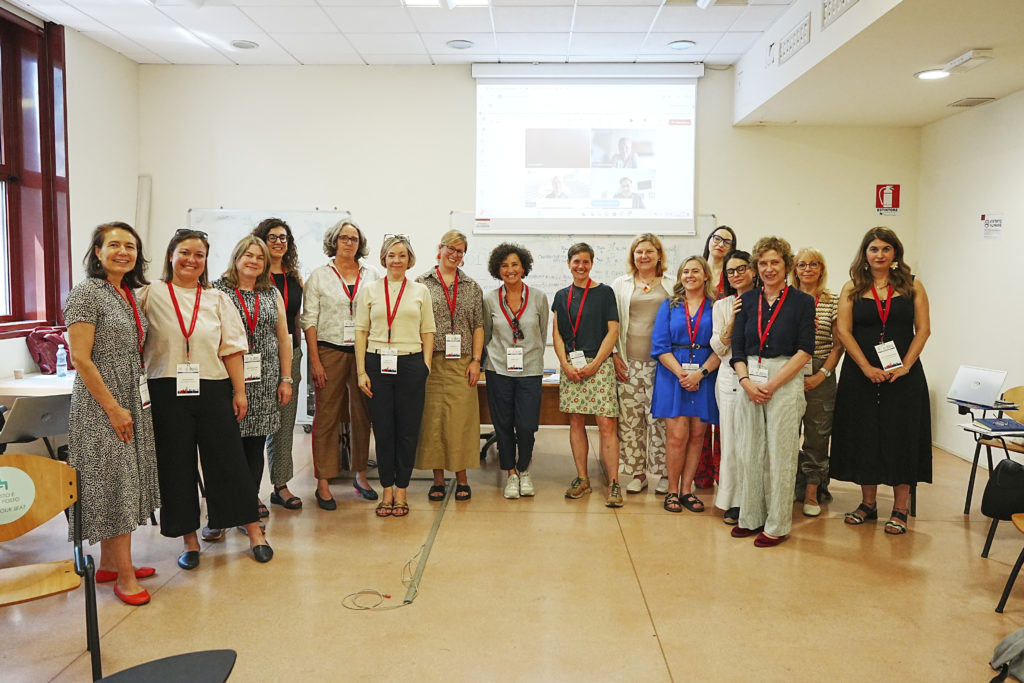
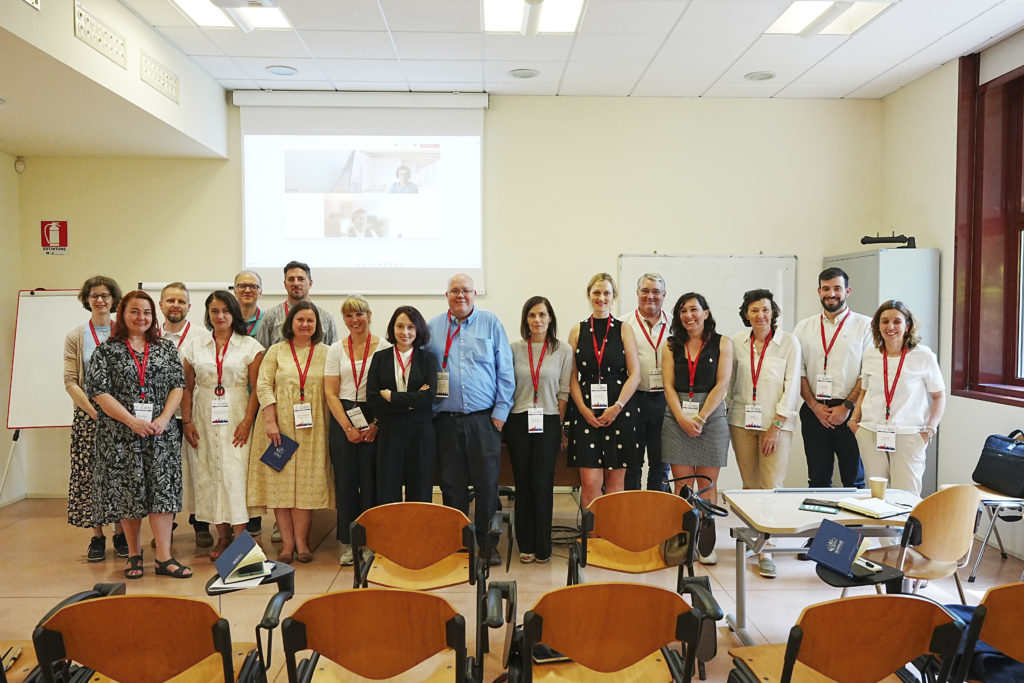
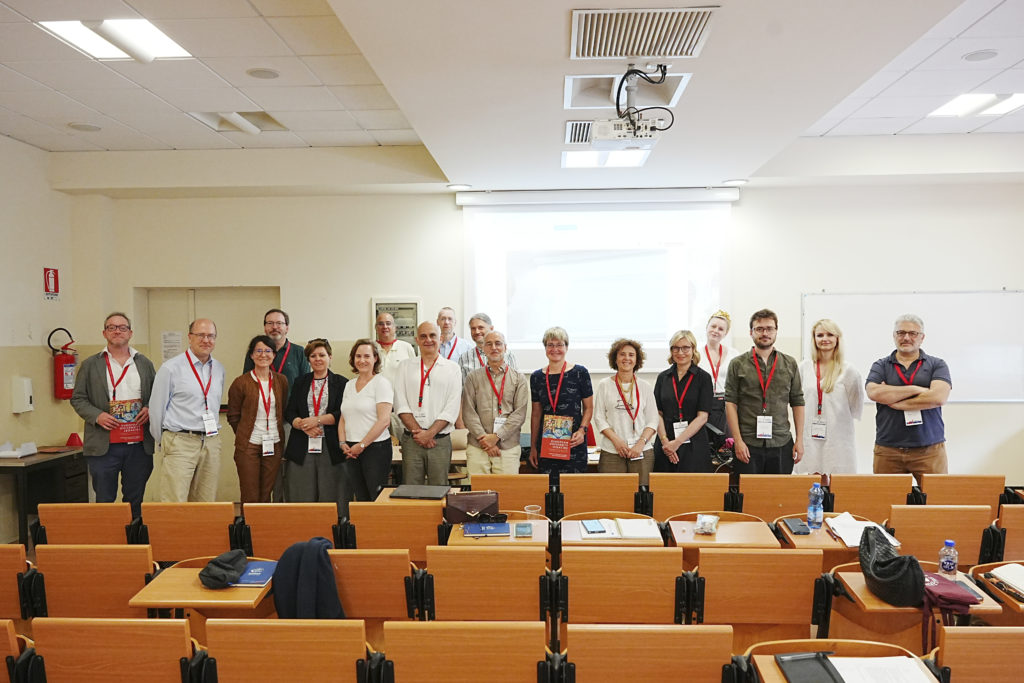
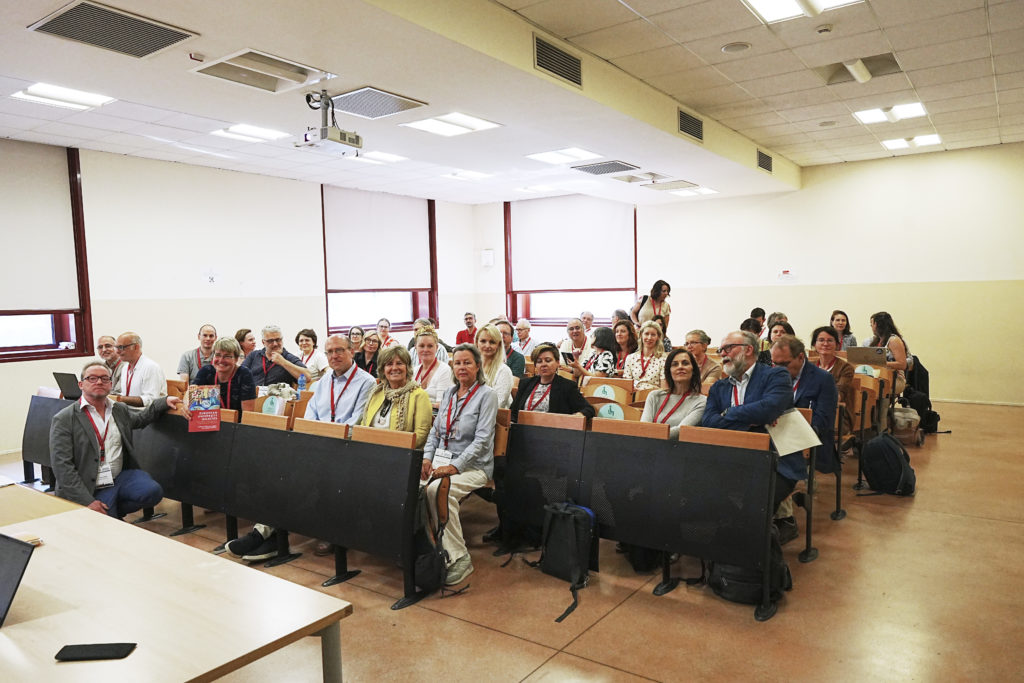
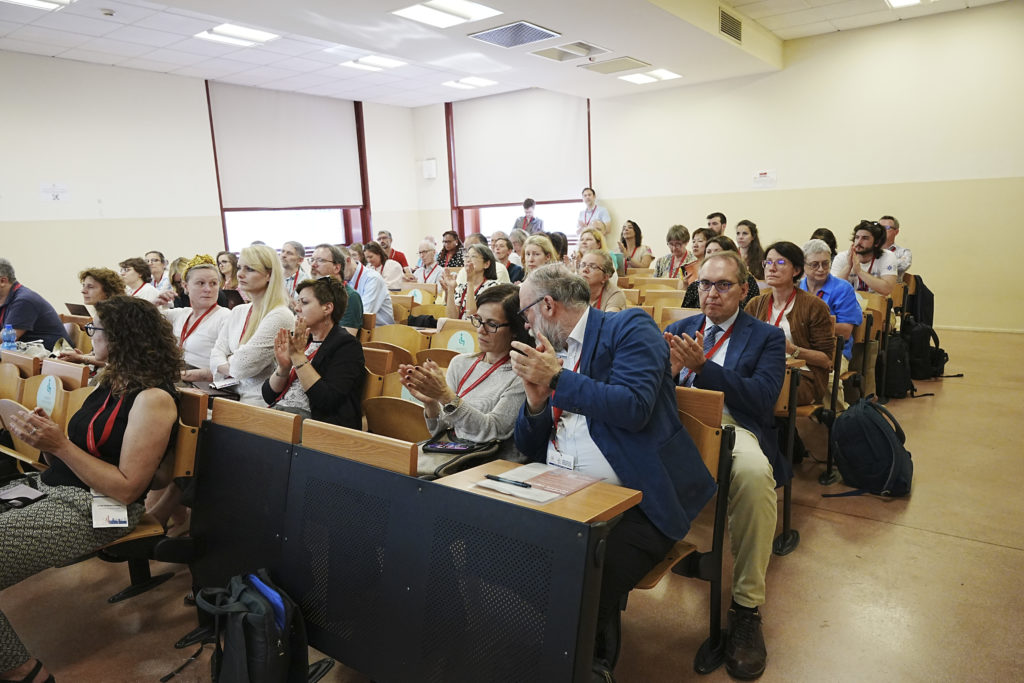
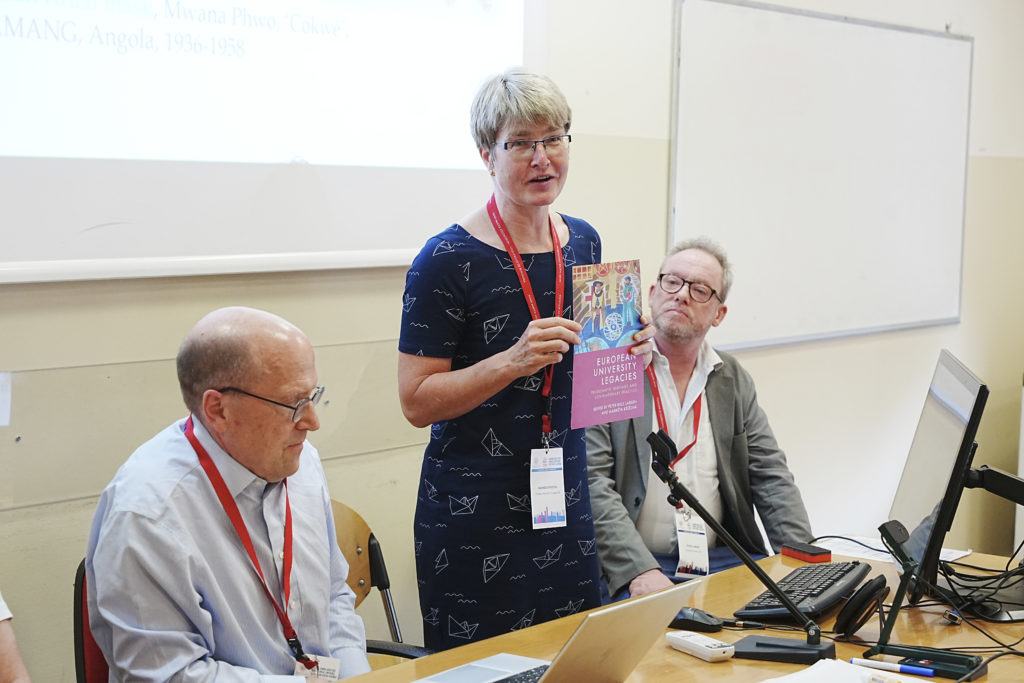
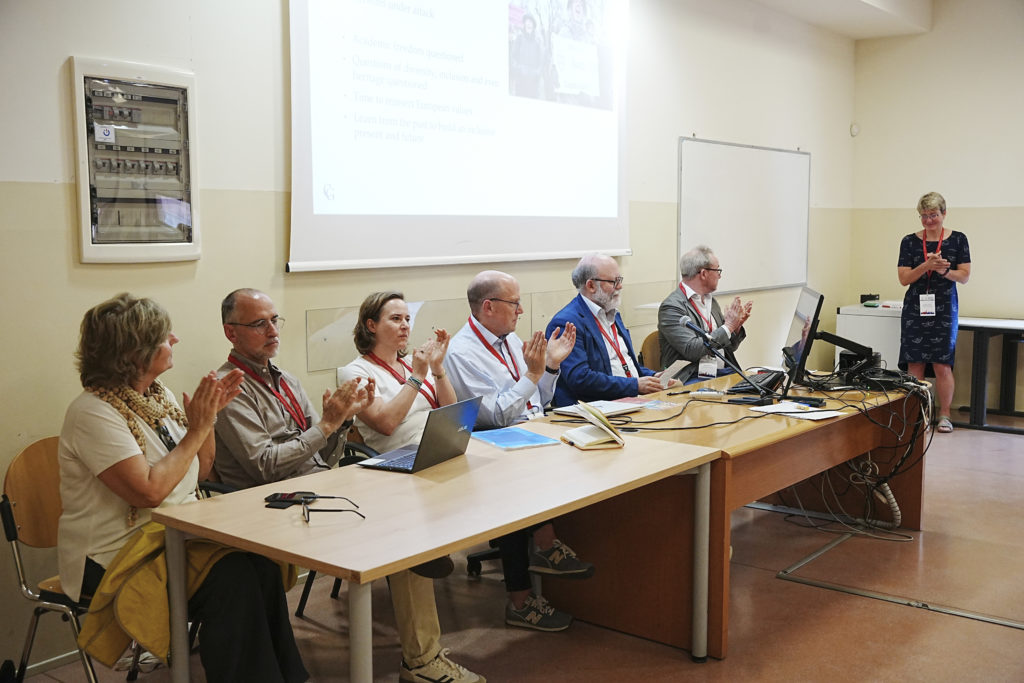
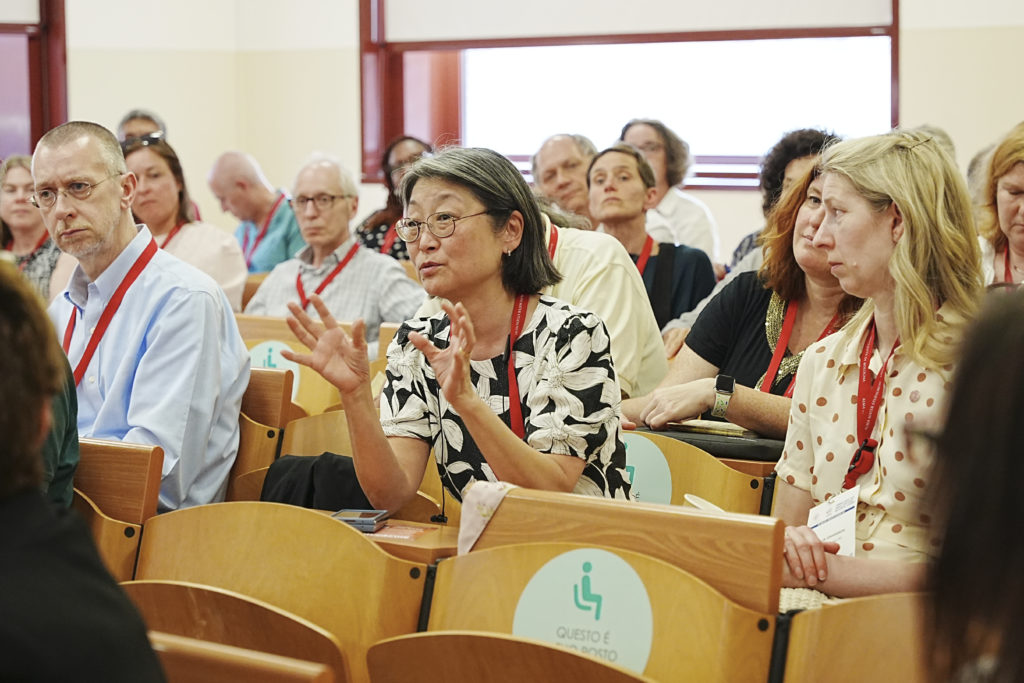
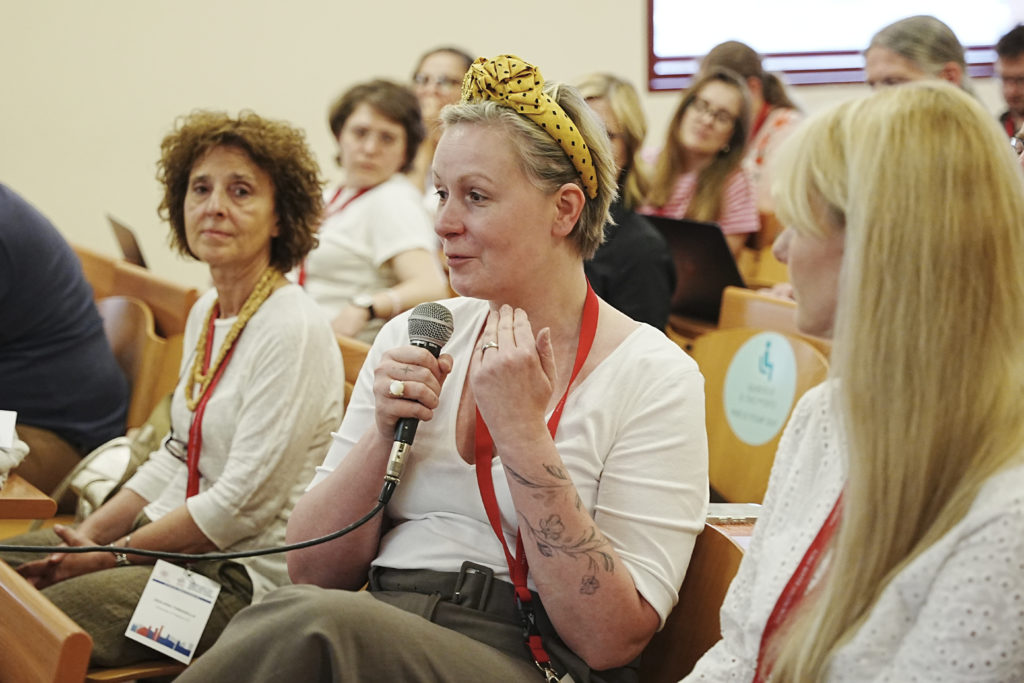
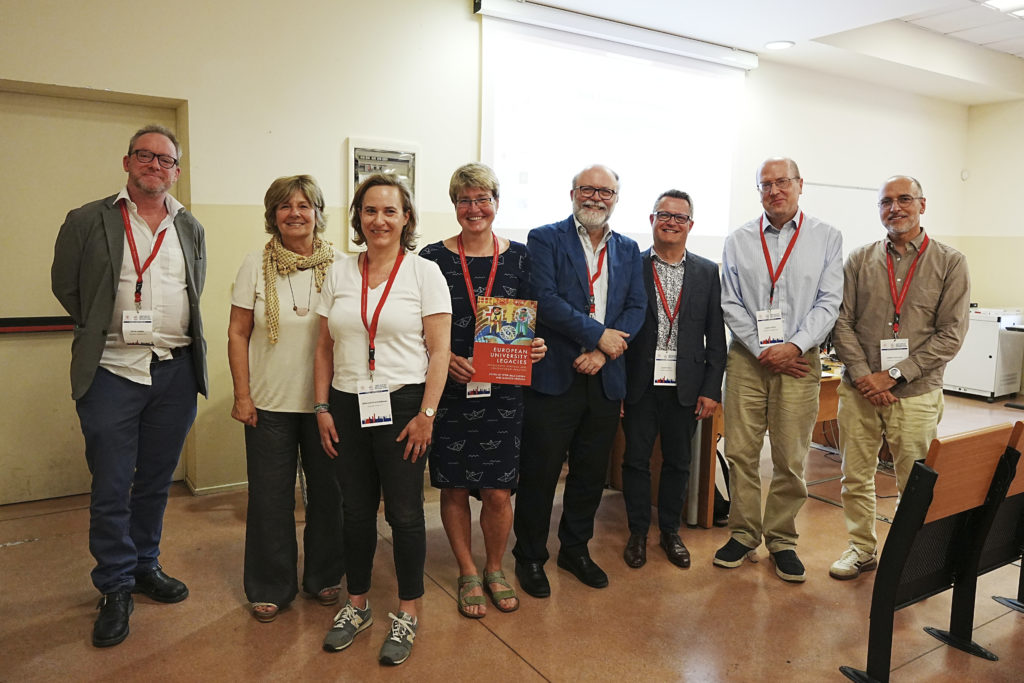
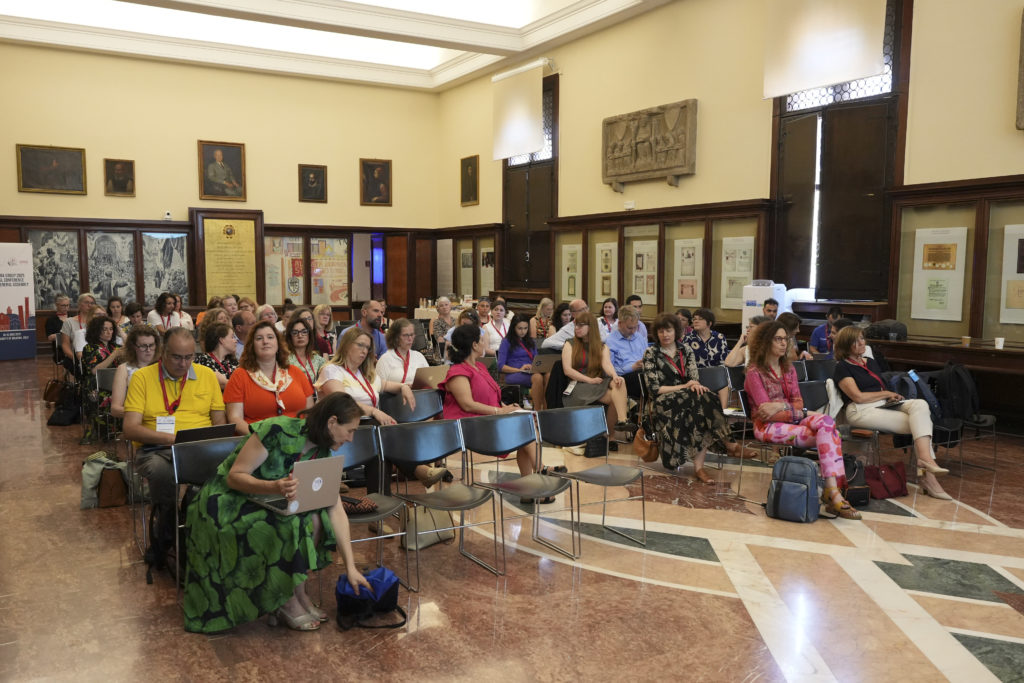
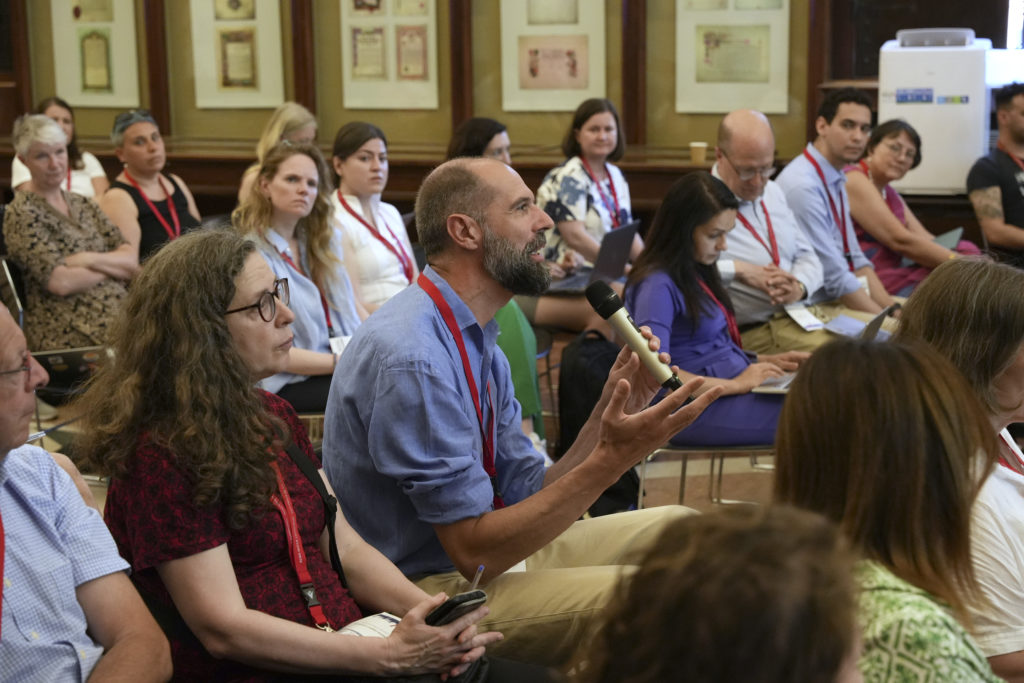
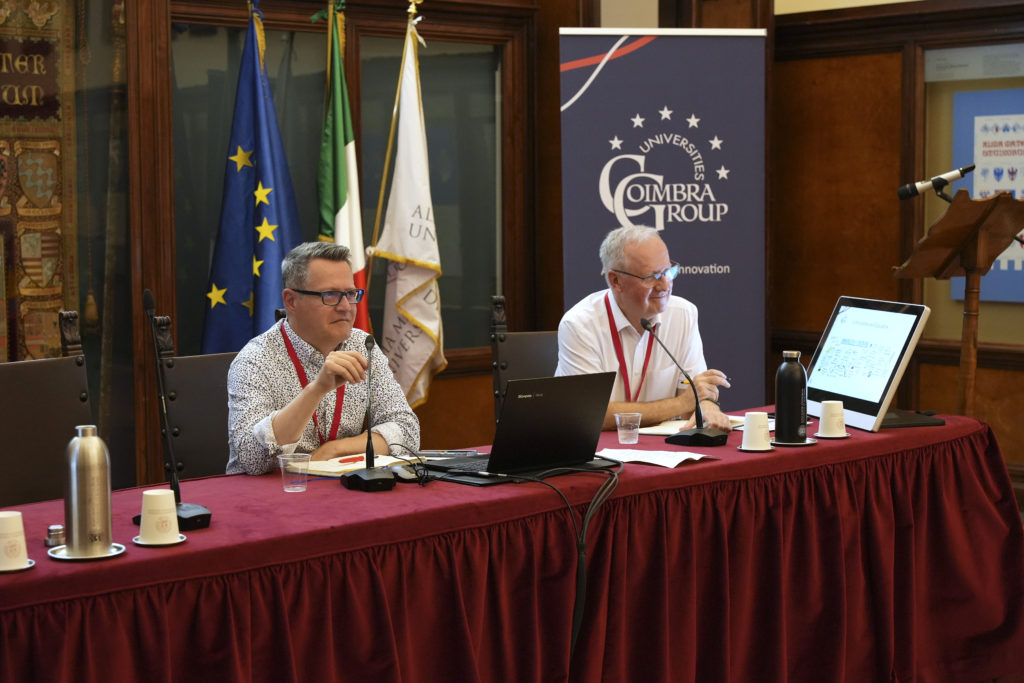
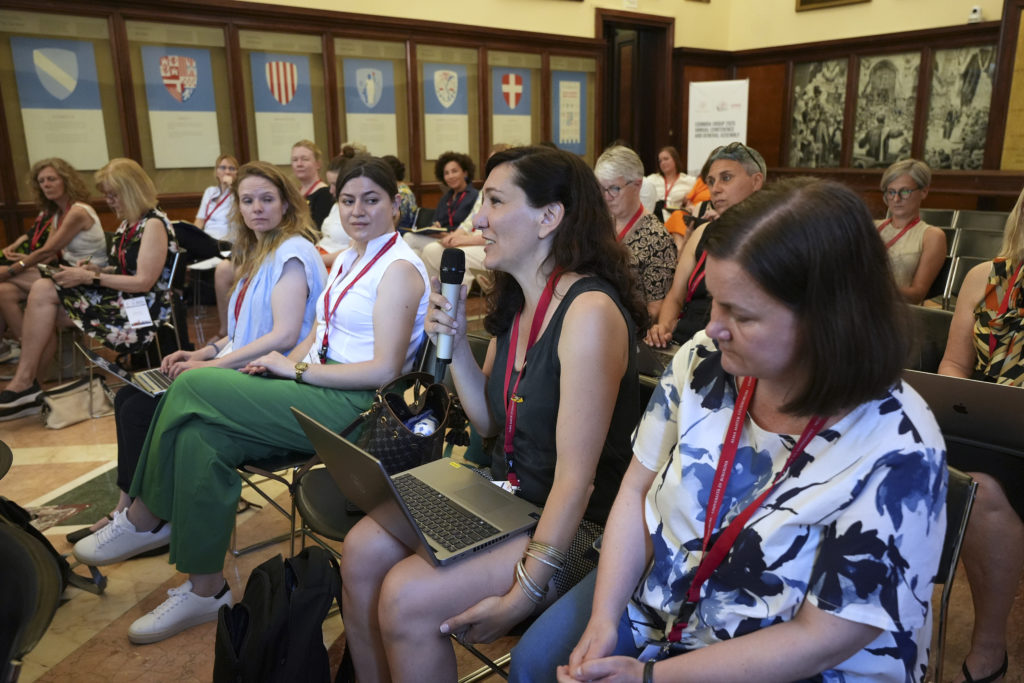
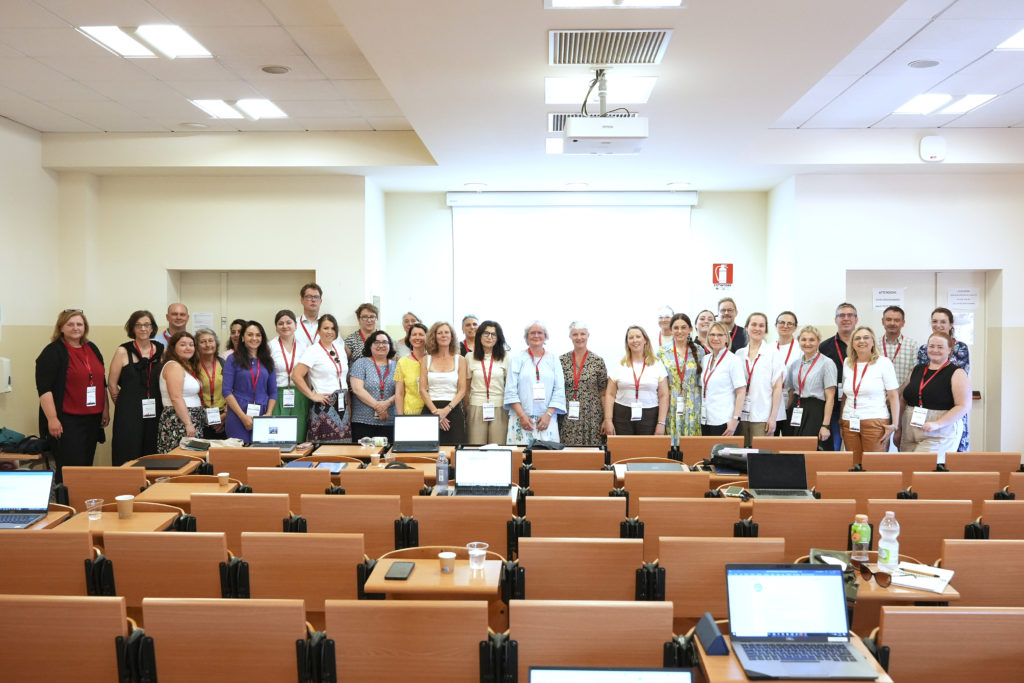
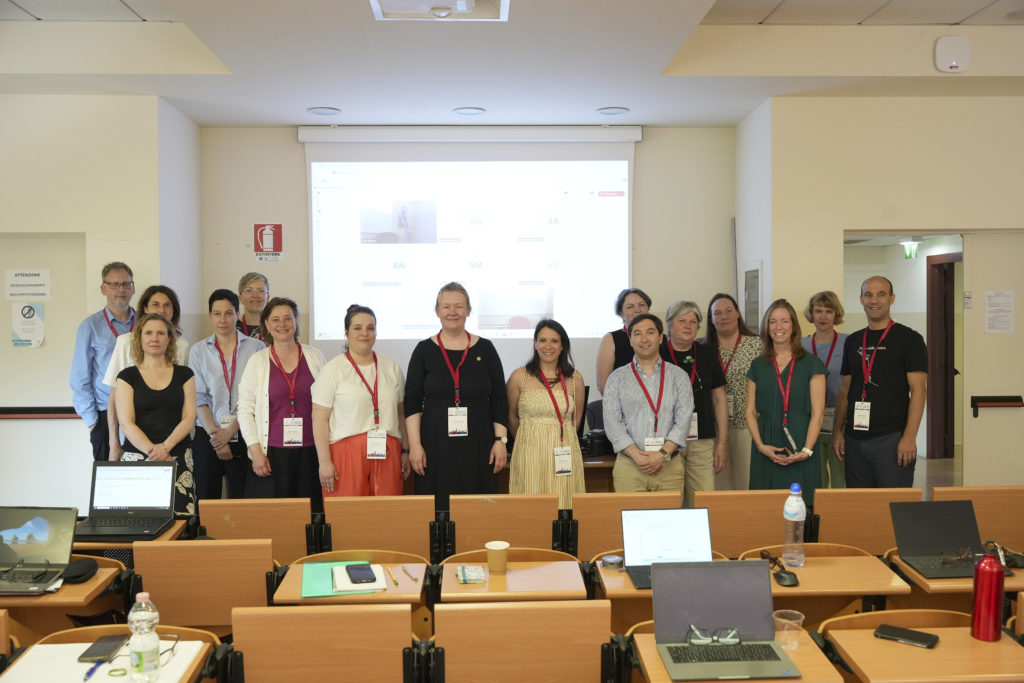
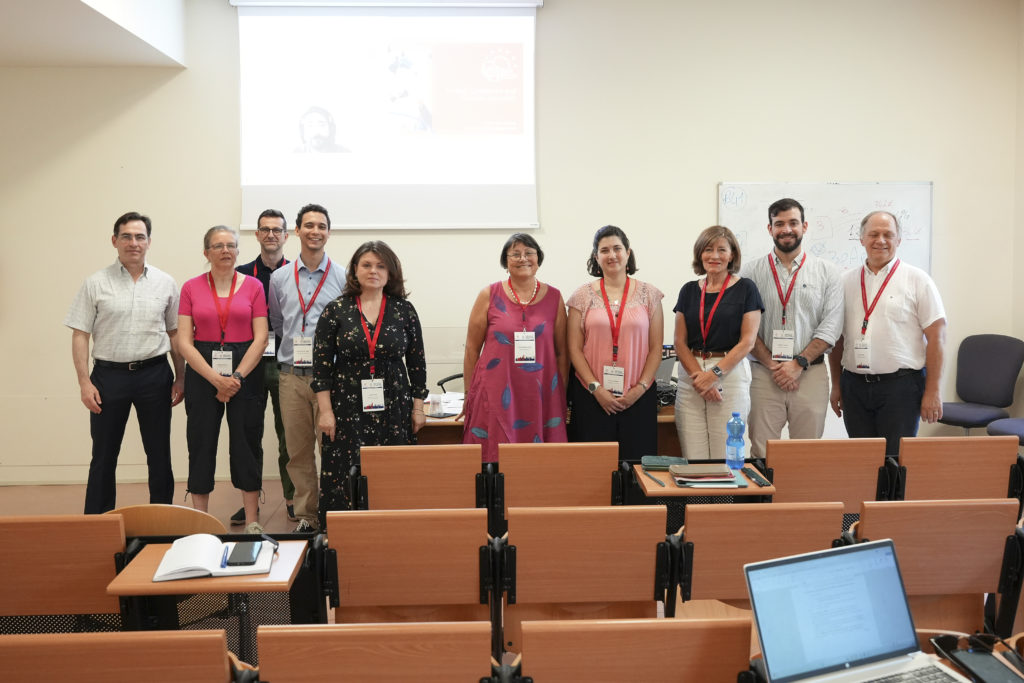
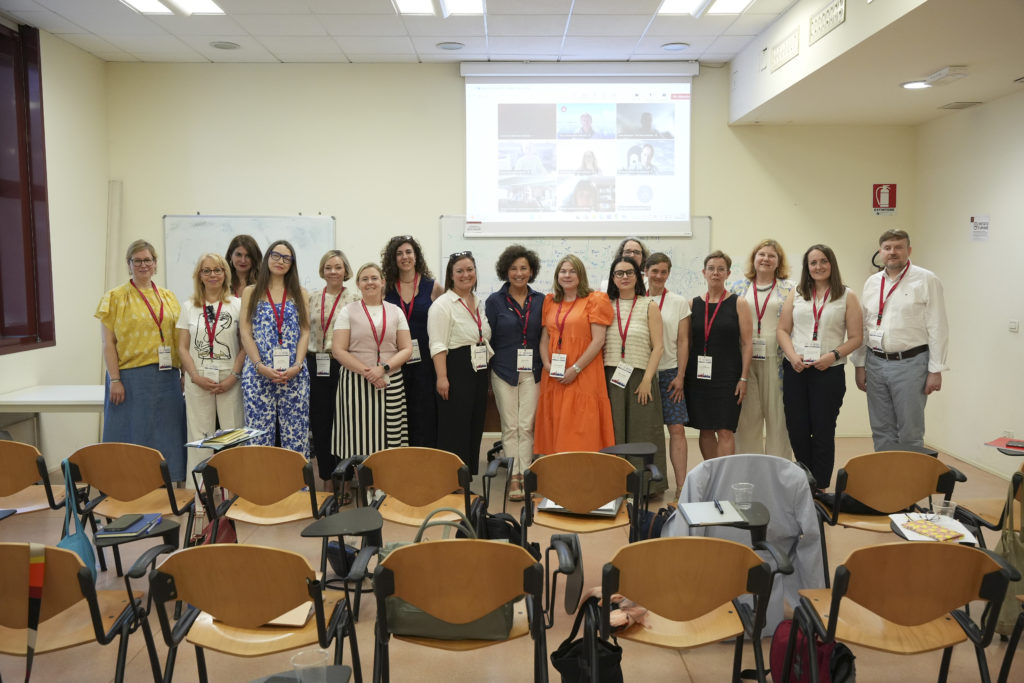
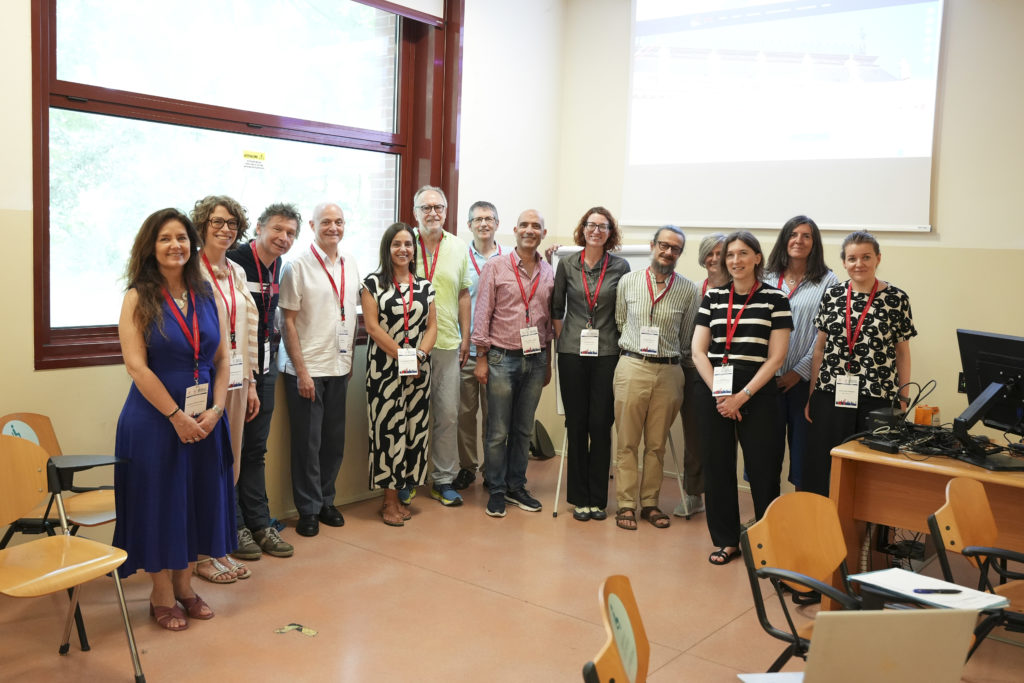
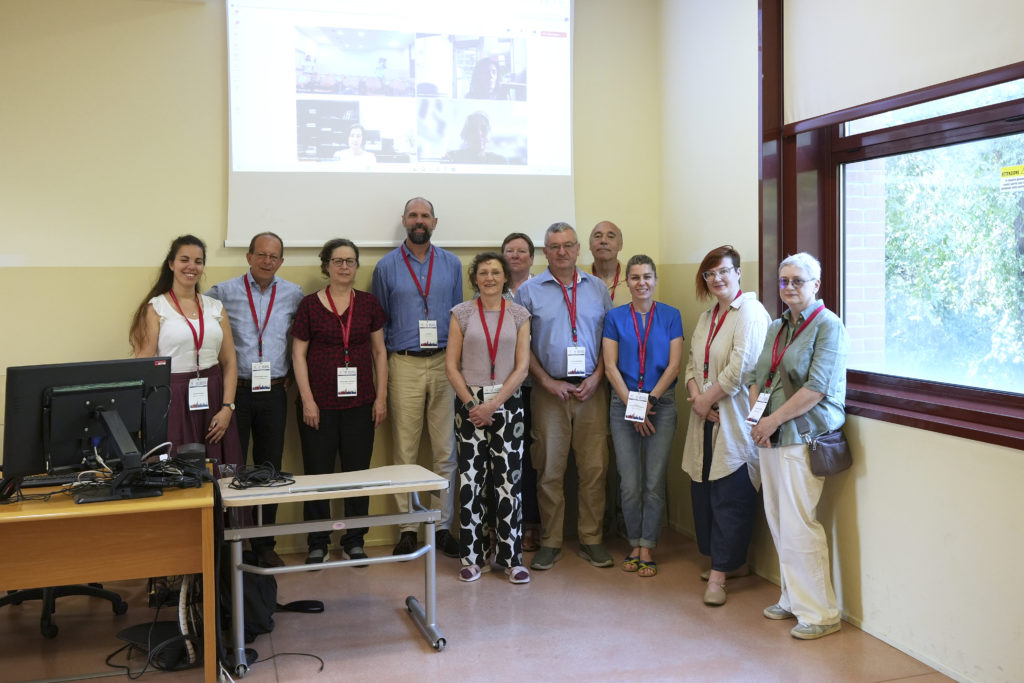
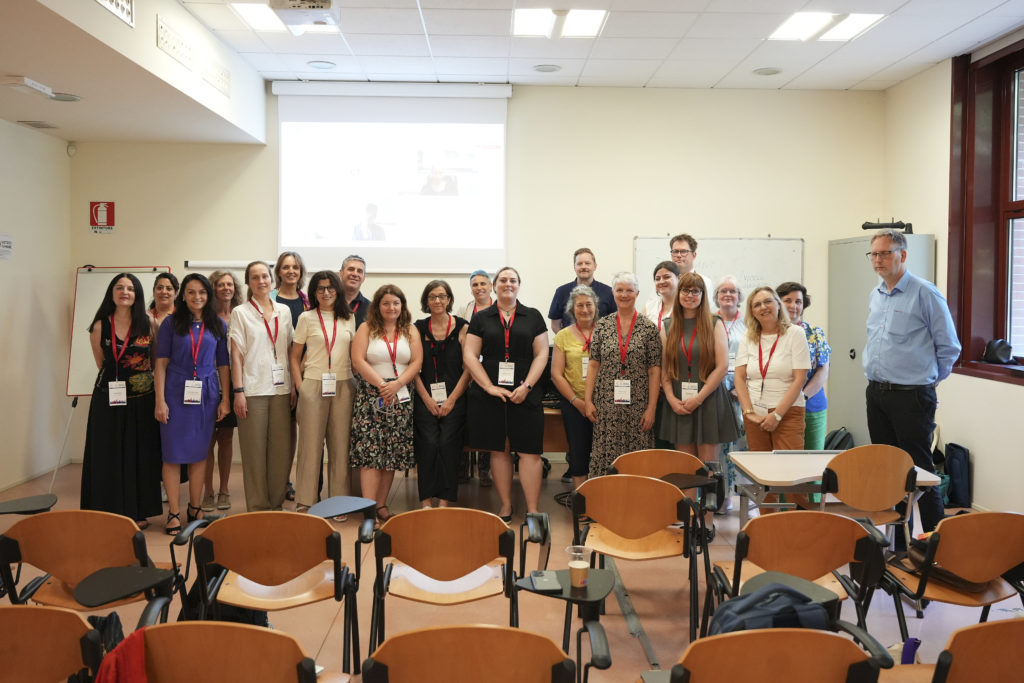
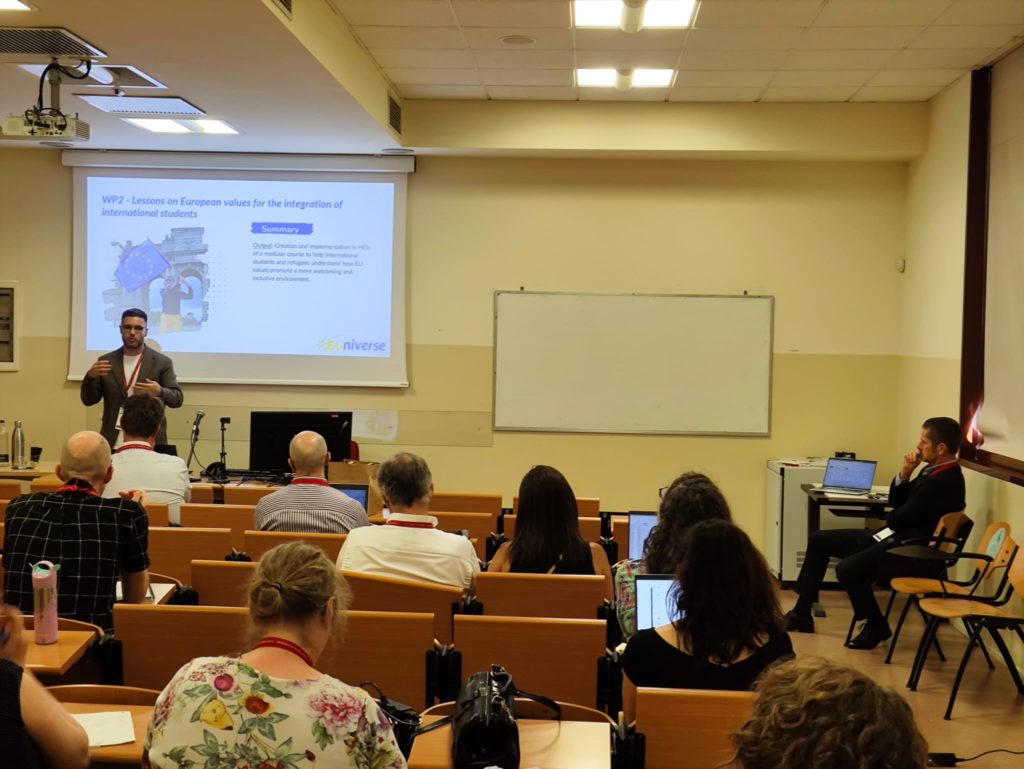
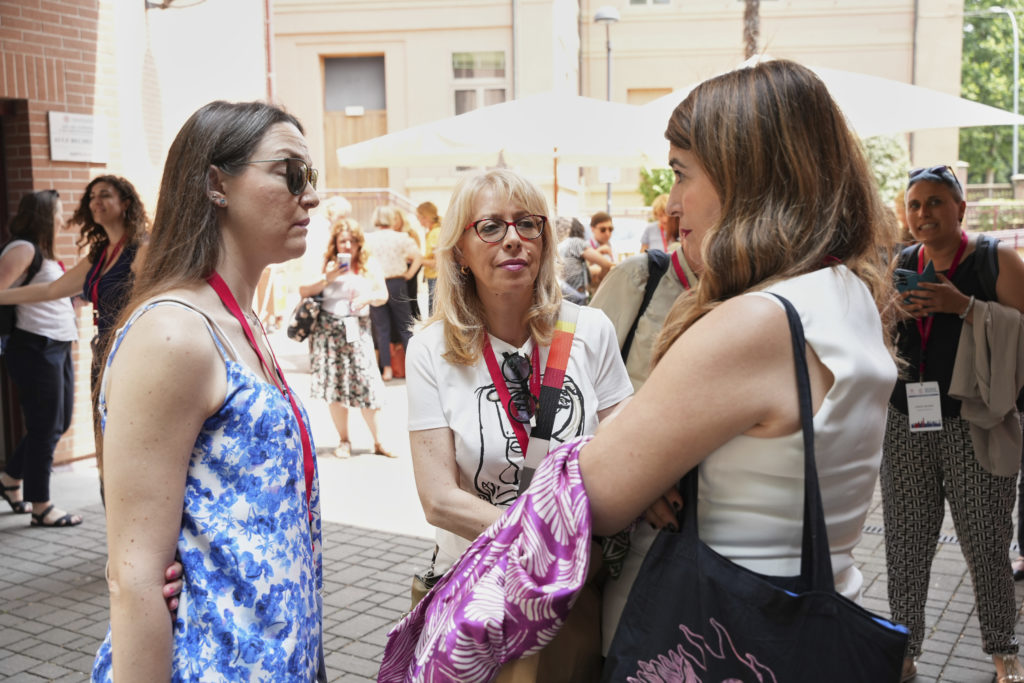
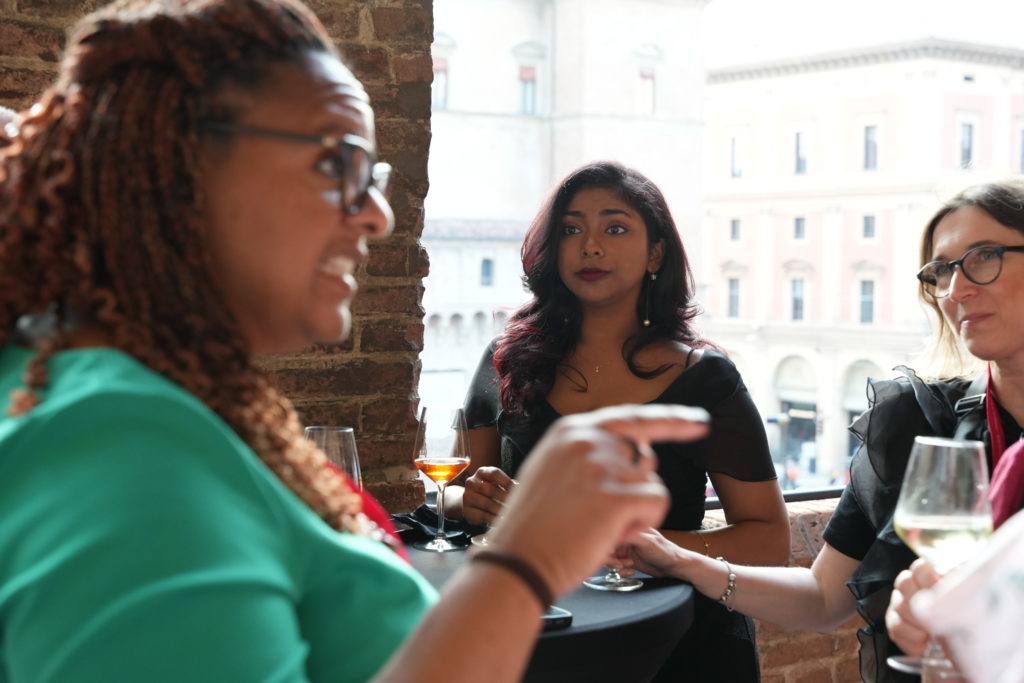

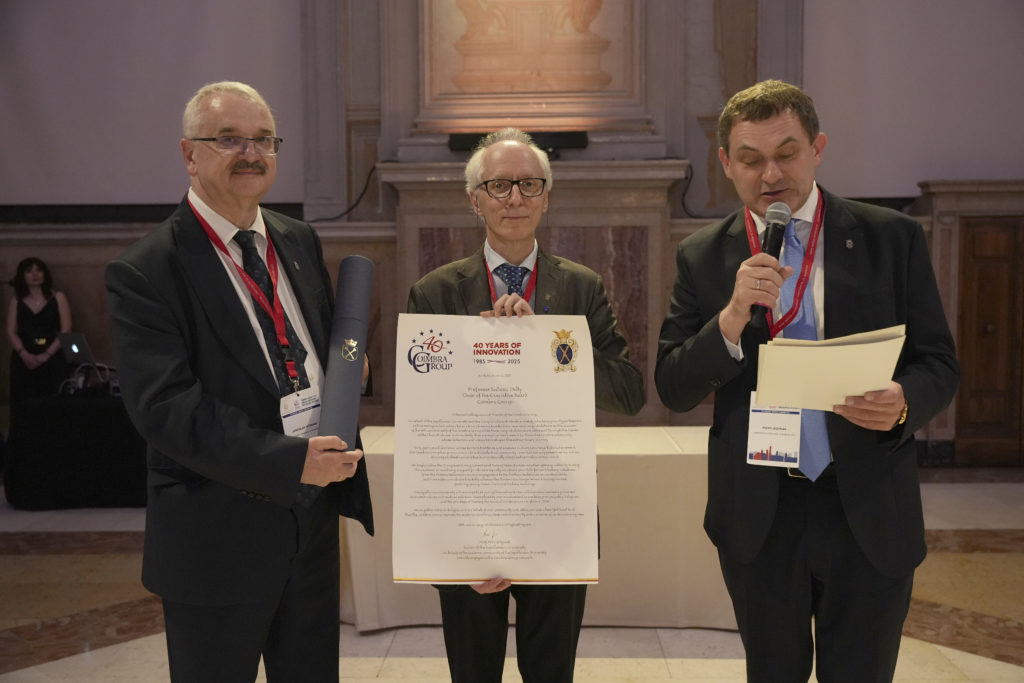
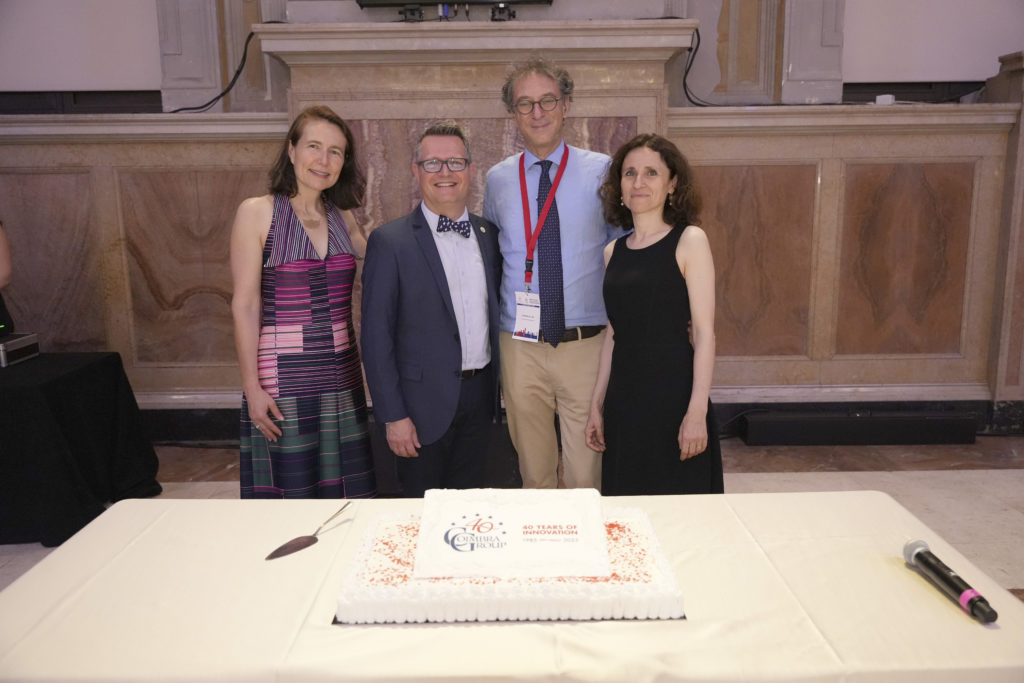
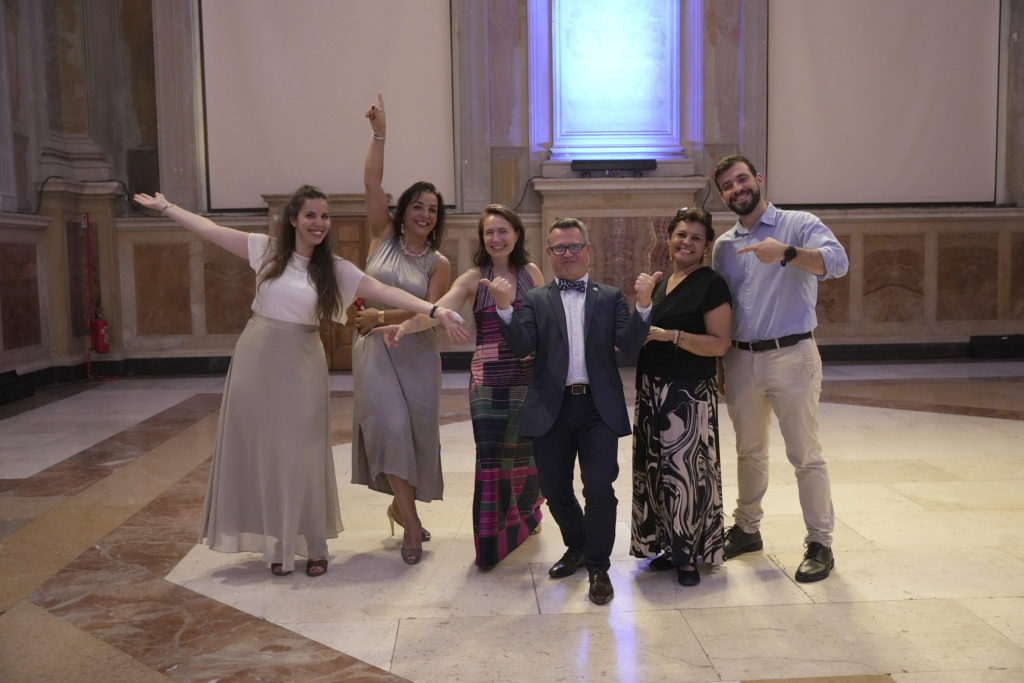
The Coimbra Group is thrilled to announce that its membership has been expanded to 42 universities of high international standard after its General Assembly approved, on Friday 13 June 2025, the applications from the University of Leeds (United Kingdom), Newcastle University (United Kingdom), and the University of Wrocław (Poland).
The three new distinguished institutions will integrate into the Coimbra Group immediately.
Professor Shearer West CBE, Vice-Chancellor and President of the University of Leeds, said: “We are excited about the opportunity to contribute to, and benefit from, the Coimbra Group. This European university network has a very strong strategic fit with the University of Leeds. In particular, its outward-looking approach, focused on delivering impact for global and local communities, aligns strongly with our own University strategy and mission”.
Professor Chris Day CBE, Vice-Chancellor and President of Newcastle University, stated: “We are delighted to be joining the Coimbra Group whose mission aligns with our shared values and our fundamental recognition of our responsibility to serve society. Newcastle has multiple shared interests with the Coimbra Group in terms of policy, including open science and open research, rankings and academic freedom. We expect to learn a lot, but also to be able to contribute significantly in areas where we are proud to have innovated and led the global higher education sector”.
Professor Robert Olkiewicz, Rector of the University of Wrocław, commented: “We are enthusiastic about the opportunity to join the Coimbra Group. The Coimbra Group’s shared dedication to international cooperation resonates deeply with our own strategic objectives. The University of Wroclaw is actively engaged in a wide array of cutting-edge research fields, including environmental sciences, digital humanities, artificial intelligence, and social sciences. We believe our expertise in these areas can complement the strengths of Coimbra Group members, and we are eager to contribute to interdisciplinary projects, knowledge sharing, and advancing academic discourse in these vital domains”.
Professor Ludovic Thilly, Chair of the Executive Board of the Coimbra Group since 2017, said the decision to invite the three new members to join the prestigious network was the result of a comprehensive strategic analysis carried out by the Executive Board and its Rectors’ Advisory Group in the past months.
“Like all other Coimbra Group members, Leeds, Newcastle, and Wroclaw excel in research, innovation and education, while championing their contribution to society. We are welcoming each of them warmly as we know they will make an impactful contribution to the network, bringing additional vision, knowledge, and influence. We cannot wait to start engaging with their academic, administrative and student communities in our thematic Working Groups and policy initiatives”, he said.
Founded in 1985 and formally constituted by Charter in 1987, the Coimbra Group is celebrating 40 years in 2025, making it the oldest university network in Europe. The association leverages advocacy and collaboration to promote higher education internationalisation, academic collaboration, excellence in learning and research, and service to society.
After this membership extension, the Coimbra Group now brings together 42 long-established European comprehensive, multidisciplinary universities of high international standard committed to creating special academic and cultural ties, share experience and knowledge and influence policy.
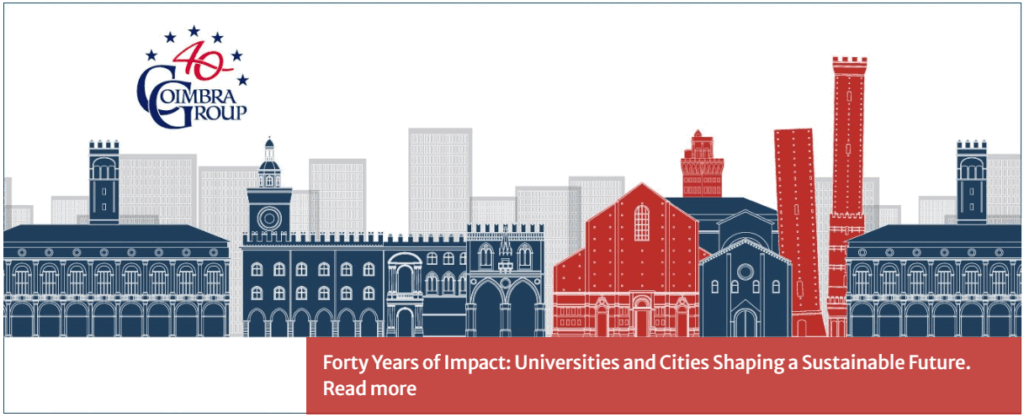
This week, the Alma Mater Studiorum – Università di Bologna hosts the 2025 Coimbra Group Annual Conference and General Assembly, celebrating 40 years of the Coimbra Group. With the theme “Forty Years of Impact: Universities and Cities Shaping a Sustainable Future”, the event brings together almost 300 representatives from all our member universities, to reflect on four decades of collaboration and innovation in European higher education.
A major highlight of this year’s Assembly is the renewed focus on two foundational pillars of the network: the Poitiers Declaration and the newly launched Durham Declaration. While the Poitiers Declaration underlines the vital link between universities and their cities in fostering social, cultural, and economic development, the Durham Declaration focuses on the pressing need for climate action and sustainability leadership in higher education.
During the open conference on Environmental Challenges (11 June, 14:30 CEST), participants will explore the outcomes of the Durham-led initiatives and hear from the Coimbra Group Climate Symposium 2025. A dedicated session on sustainability – developed in partnership with Durham University – will showcase how academic institutions can be drivers of environmental transformation.
The second open conference, “Empowering Local and Global Communities: From the Poitiers Declaration to the Future” (12 June, 11:30 CEST), will bring together rectors and city mayors in a high-level roundtable to discuss the evolving university-city alliance and how these partnerships can inspire global models of inclusive growth and shared responsibility.
The programme also features:
– Meetings of the very dynamic 12 Working Groups
– The 3 Minute Thesis (3MT) Live Final
– An Open Session on the European Universities Alliances focused on social responsibility
– Opportunities for peer exchange between Erasmus Student Network and CG contact points
Livestreams of key sessions will be available via the University of Bologna’s official YouTube channel, allowing participants across Europe and beyond to join in. You will find here all the sessions which will be livestreamed.
As we look ahead to the next 40 years, this week is not just a celebration – it’s a call to action!
Luc Sels, Rector, KU Leuven
Françoise Smets, Rector, UCLouvain
On the occasion of our shared 600th anniversary, UCLouvain and KU Leuven welcomed European rectors and political leaders to Brussels for a milestone conference: “Unlocking Innovation: Research-Intensive Universities as Drivers of Competitiveness and Societal Impact”. The timing could not be more fitting. At a time when Europe is at a strategic crossroads, the role of universities in shaping its future has never been more critical.
Our ambition is clear: to place research-intensive European universities at the heart of societal transformation. This involves aligning excellent science with innovation, sustainable development, and social progress – across disciplines, sectors, and borders.
This conference, which brought together, for the first time, the 47 members of the LERU and The Guild networks (many of them being also members of the Coimbra Group), offered a powerful reminder that universities are more than just centers of knowledge production. They are also stewards of values. In times of crisis, we are not only resilient, but also essential. Our institutions have withstood wars, censorship and destruction, only to emerge stronger and more united.
And this moment demands such unity. From the erosion of academic freedom to the pressures on open science and critical thinking, universities must speak out and take action. Hope is not passive. It is an active force that should guide us through difficult times.
We were deeply inspired by the global perspective offered by our colleagues from both sides of the Atlantic. Their message was consistent: universities must be razor-focused on their missions yet never retreat from their responsibility to society. Our role is not only to produce knowledge, but also to defend the conditions that allow it to thrive.
As Europe charts its future, its universities must be at the table — not as stakeholders, but as strategic partners. The European institutions are drafting plans to implement recommendations from several high-level reports, such as the Draghi and Letta reports. Research-intensive universities will play a pivotal role in shaping and implementing these plans.
We are grateful to everyone who joined us in Brussels, and we are looking ahead with a shared sense of purpose as we work with all our partners, including our fellow members of the Coimbra Group. The time to act is now, driven by the belief that the more challenging the international context becomes, the more collaboration we need among ourselves and with our stakeholders.
Coimbra Group Statement ahead of the EU-UK Summit of 19th May 2025
Today, 19th May, the first post-Brexit EU-UK Summit is taking place in London. In the lead-up to this Summit, both parties have expressed their desire to “reset” the EU-UK relations, and work towards a closer relationship in a series of policy areas. Amongst the topics to be discussed during the Summit, the possibility to establish a Youth opportunity scheme is on the agenda.
This new tentative agreement, similar to the reciprocal youth mobility agreements the UK already has with 13 countries and territories, would allow young people between 18 and 30 years old to move, study and work freely between the UK and EU countries for a limited period of time. The Coimbra Group welcomes the high priority to this topic given by policy makers, and calls both the EU and the UK to tackle the discussion with mutual understanding, open-mindedness, and ambition.
Coimbra Group universities – the longest established European network, formed by 39 leading institutions from across the continent, including Bristol, Durham and Edinburgh in the UK – strongly support the establishment of a youth opportunity scheme between the EU and the UK. “Even without re-establishing fully-fledged free movement for our students, such a scheme could nevertheless address partially some of the concerns that Universities have been raising since the withdrawal of the UK from the EU in 2020, and the progressive end of the participation of UK universities in the Erasmus+ programme”, said Ludovic Thilly, Chair of the Coimbra Group Executive Board.
The Coimbra Group highlights how international study and work experiences provide young people with a set of unique competences and skills that enhance academic progress, social resilience, intercultural understanding, individual employability and the development of a highly skilled and globally minded workforce. Enhancing youth exchanges would thus produce a range of direct and indirect benefits for both the UK’s and the EU’s economies and societies, and for Europe as a whole.
In the current changing geopolitical context, Coimbra Group encourages the UK government and the EU to find common ground for an agreement to be reached in a reasonable timeframe, and not to postpone this negotiation again indefinitely. We recognise though that realism is needed at a time in which many Universities are impacted by significant financial constraints. We therefore call the EU and the UK to strike the right balance between ambition and realism. To this end we strongly encourage both parties to adopt a creative approach and come to a mutually beneficial agreement in good faith.
Coimbra Group is delighted to announce the names of the three finalists for the ninth edition of its annual Three Minute Thesis (3MT) Competition:
- Ms Bianca Brandl (University of Graz)
- Mr Uffe Kjærgaard (Aarhus University)
- Ms Almudena Moreno Borrallo (Trinity College Dublin)
Congratulations to all participants and special applause to our 2025 finalists! Almudena, Bianca and Uffe have been shortlisted among 28 talented presenters from 19 countries, following an online vote among all Coimbra Group Universities. Voters (one vote per institution) were asked to assign 3, 2 and 1 point(s) to their preferred top three candidates, all of them PhD students nominated by one of our member universities.
They will now go on to perform LIVE at the eagerly awaited final, taking place this year at the University of Bologna on Thursday, 12 June, from 13h45-14h00 CET (also live streamed on YouTube).
The three finalists will have a unique opportunity to pitch their research in 3 minutes to the broader European community forming the Coimbra Group in connection with the network’s 40th Anniversary Annual Conference & General Assembly.
The live final is the second and last phase of the competition, where the three shortlisted candidates are assessed by a judging panel for a first prize of € 2.000 and two runners-up of € 1.500 each. The results will be announced on the same day.
The Coimbra Group launched its 3MT Competition in 2017, as an initiative of its Doctoral Studies Working Group to advance the professional development of PhD candidates.
Founded by The University of Queensland, Australia, 3MT cultivates students’ academic, presentation, and research communication skills. The competition supports their capacity to effectively explain their research in three minutes, in a language appropriate to a non-specialist audience.
Input from the Coimbra Group on the EU’s next MFF 2028-2034
The Coimbra Group (CG) welcomes the opportunity to provide feedback on the European Union’s next Multiannual Financial Framework (MFF) during this development phase. We highly appreciate the chance, in these challenging times, to engage in this important process and contribute to shaping the EU’s post-2027 long-term budget.
To gather insights and experiences and elaborate our network’s position, the 39 CG universities, all long-established research-intensive leading European higher education institutions, located in 22 countries, were consulted. Our contribution focuses mostly on the consultations on the EU funding for competitiveness (1) and the EU funding for cross-border education, training, and solidarity; youth, media, culture, and creative sectors; values, and civil society (2) – with a particular emphasis on our views for the future Erasmus+ programme and EU’s framework programme for research and innovation (R&I).
The first section of our input paper submitted in response to the Commission’s public consultation on the EU’s next MFF presents a set of considerations and recommendations, followed by concrete feedback on:
- Strengthening European competitiveness through bold investment in Research and Innovation
- Developing European values through Education and Mobility
- CG Universities’ overall experience with EU funding
EU funding programmes are essential for our universities, bringing a wide range of benefits and opportunities. However current programmes remain largely underfunded. Coimbra Group therefore calls for significantly strengthened budgets for the next generation of both Erasmus+ and the EU R&I framework programme.
We look forward to continuing collaborating actively with the European Commission and other EU institutions on this important work.
Full position paper:
Emmanuelle Gardan, Coimbra Group Office Director
As a network of universities which recently committed to enhancing their collaboration on climate change and sustainability, there is a lot that the Coimbra Group can do to facilitate the work of the European Commission related to climate and environmental policy. This is the message that echoed on 30 April during a fruitful high-level meeting where the Coimbra Group was invited by the European Commission’s Director-General for Climate Action, Mr Kurt Vandenberghe, and his team, to outline the main orientations of the Durham Declaration and its next steps.
The discussion reflected a great sense of alignment between the Coimbra Group (CG) and DG CLIMA. In these times marked by radical changes globally, but one unchanged issue at the nexus of all others – the challenge of climate change – the cooperation between the academic community and the European Commission was emphasized as being more essential than ever. As such the Durham Declaration was welcomed as a very strong signal.
Several promising opportunities for future dialogue and collaboration with DG CLIMA have emerged from this meeting, which was attended by the Executive Board (EB) Chair, Ludovic Thilly, together with the Vice-Chancellor of Durham University, Karen O’Brien, EB member Danny Donoghue, and CG Brussels Office. They will further nurture the first orientations of the implementation roadmap.
The need to continue doing science and advancing the scientific knowledge base on climate change and this, in all disciplines, including also the social sciences and humanities, was largely discussed in light of the current context. It was also commonly agreed that more transdisciplinary research and cross-sectoral work are still needed in this field.
The meeting addressed the critical role that universities play in translating knowledge into innovations and solutions to the climate crisis. Networks like the Coimbra Group, where member universities are closely engaged with their cities and local communities, can greatly contribute to scale up local experiments at European and global levels to help achieve the climate and sustainable development goals. They can also help building more success stories about sustainability, and what it means for the industry, for the economy, for society.
Other dimensions tackled during the exchange of views include the impact of education; universities’ engagement in science-based policy making; climate disinformation; as well as the importance of international engagement on climate and sustainability. Universities have by nature a fundamental role to play here. At the Coimbra Group, we can count on the Global Partnerships and Latin America Working Groups and their long-standing relations with partners outside Europe. The announcement of a presentation of the Durham Declaration at the COP30 in Brazil later this year also received positive feedback.
We now look forward to engaging CG members in this constructive dialogue with the Commission, in alignment with the commitment taken to “support transformative change through our actions as partners with public organisations”, one of the seven principles promoted in the Durham Declaration signed by the Rectors of CG Universities on 26 March 2025.


